Archived Blog Posts
3 Easy Home Maintenance Tips to Help You Prevent a Water Damage Event: SERVPRO of North Atlanta / Buckhead
3/10/2022 (Permalink)
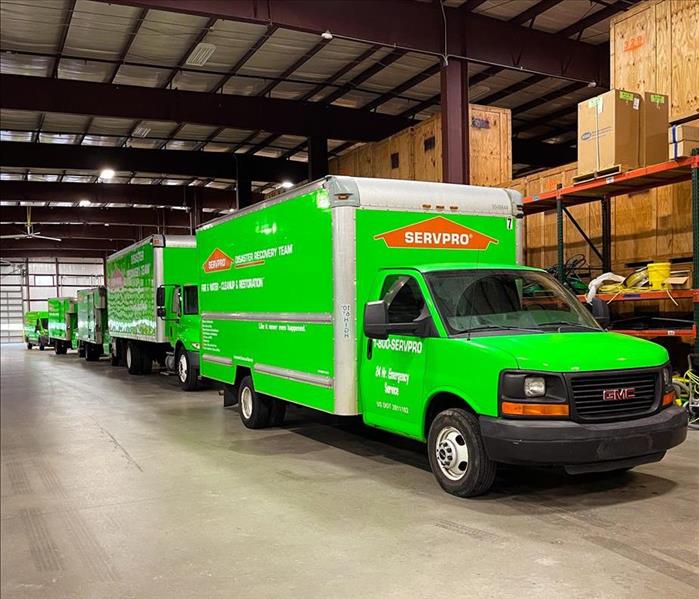 SERVPRO of North Atlanta / Buckhead keeps its trucks ready to respond immediately to your water damage emergency.
SERVPRO of North Atlanta / Buckhead keeps its trucks ready to respond immediately to your water damage emergency.
Water damage can be a costly and devastating event. At SERVPRO of North Atlanta / Buckhead, we have often found that careful maintenance can diminish the risk and costs of water damage restoration. The water damage restoration process can be stressful, but by following some simple home maintenance tips, you can help prevent flooding from structural or maintenance issues in your home.
1) Assess your water heater to minimize water repair risk.
Water heater issues are common when it comes to our emergency water cleanup calls in Buckhead, GA and Peachtree Hills, GA. With regular maintenance, you can prevent a surprise water heater flood in your home. Make sure the water heater's thermostat is regulating the temperature properly to prevent pressure buildup that can cause a water leak.
If you notice an odd taste or odor in the water from your water heater, it may have rust or sediment buildup inside. Also, if your water starts to make strange noises, it could need inspection or replacement to prevent a surprise flood.
2) Inspect your appliance hoses and connectors for leaks and replace them if they start showing wear.
Look for any cracks, kinks, unraveling, wear, or corrosion on the hoses and connectors. If you find any damage, replace them immediately. Most manufacturers and plumbers also recommend replacing water hoses and connectors every 3-5 years to prevent surprise water damage issues.
3) Replace old caulking in your windows and doors to prevent wet areas and moisture around the windows.
We often get calls for mitigation work in Atlanta, GA and Sandy Springs, GA for this kind of mitigation work. Caulking your windows can not only stop water leaks but also help to keep out drafts. It is a simple process that you can do yourself. Most window caulks should last about five years, but you should inspect your caulking every year and replace it if you notice any cracks developing or if you see it pulling away from the window.
You should also check your exterior door flashings for holes or rust that can allow water entry. If your doors are properly caulked, you can also help prevent premature flashing failure.
We are Here to Help for All of Your Water Repair Needs
If you or someone you know needs water damage restoration service, our team at SERVPRO of North Atlanta / Buckhead is Here to Help!
Save our number for the future or call today for rapid response from our IICRC trained water restoration technicians.
Call today! (404) 261-2925
Lightning and Risk of Fire to Your Home
2/21/2022 (Permalink)
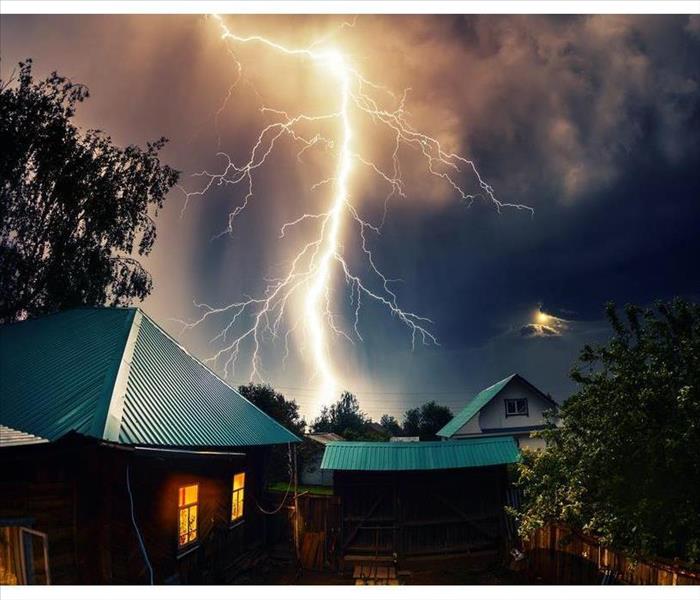 Electrical storms and strikes can develop quickly, wreaking havoc on your life by causing your home to catch fire.
Electrical storms and strikes can develop quickly, wreaking havoc on your life by causing your home to catch fire.
Electrical Storms and Potential Risks To Your Property
Lightning is one of the most dangerous natural forces in the world, and this phenomenon has the ability to cause significant damage to the homes that it strikes. One of the major hazards that it poses is the threat of lighting fire to your residence. If you are a homeowner in Morningside, GA, read on for more information about electrical storms and the potential risks to your property.
How Does It Enter Your Home?
A bolt of lightning will always find the quickest path to enter the ground, and unfortunately, homes can sometimes be part of that path. Your home can be entered a number of ways.
- Direct strikes
- Power, cable or phone lines
- Electrical gates or doors
- Metal pipes
How Do Fires Start?
Once a strike occurs, the risk of a house fire is considerable. A bolt is a current of electricity that can reach temperatures comparable with the surface of the sun. The intense heat is enough to ignite a flame, especially in highly flammable parts of the home, such as the attic or within the walls where insulation is present. Electrical charges can also create dangerous sparks responsible for lighting fire to homes and buildings.
Stay Safe During Storms
Remember, you are within striking distance if you can hear thunder. During storms, stay inside, away from doors and windows, and avoid using items that place you in contact with plumbing or electricity. If your home suffers a strike, contact the fire department to check over your property. If you detect smoke, call 911 and evacuate everyone from the premises immediately.
Electrical storms and strikes can form quickly and wreak havoc in your life by lighting fire to your home. If your dwelling is a victim of this type of blaze, don’t hesitate to reach out to an emergency restoration service to assist you.
3 Steps to Take After a Pipe Break
2/7/2022 (Permalink)
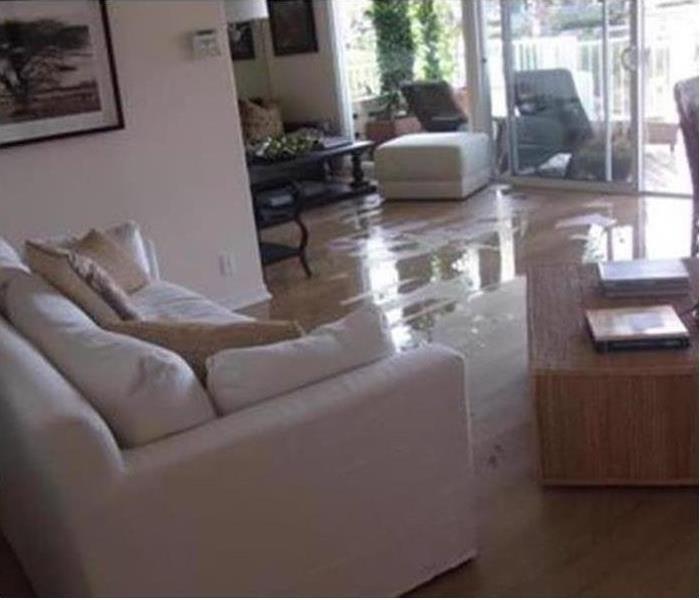 Water damage due to a bursting pipe in Lenox Square, GA.
Water damage due to a bursting pipe in Lenox Square, GA.
After a Pipe Break, Follow These 3 Steps
Many homeowners in Lenox Square, GA worry about a flash flood when the weather outside gets a little too wet. However, one commonly overlooked source of flooding is bursting pipes. A homeowner should contact a professional to fix a broken pipe immediately. It is the only way to curtail the level of water damage from getting any worse.
1. Stop the Flow of Water
The first thing you as a homeowner can do is prevent the flooding from getting any worse. You will need to shut off the main water line. After you do so, you still need to drain the pipes of all water. This will require you to run every sink and flush each toilet in your house at least once. You will also need to turn off your home’s water heater. Once there is no running tap water left, the leak should stop entirely.
2. Inspect the Damage
Next, you will need to locate the burst pipes. If you are able to find the broken pipe, then you should take pictures of the damage for insurance purposes. If you cannot find the culprit, then you will need to bring in a professional crew as soon as possible.
3. Contact a Professional Drying and Remediation Crew
For homeowners in Lenox Square, GA who think they are fairly handy around the house, it is always a good idea to call a professional team to take care of any water damage just to be safe. There is a lot of remediation that needs to take place, such as drying any damaged structures and preventing mold growth. Professionals also know how to safely work around water to prevent electrocution or illness.
It only takes a matter of minutes for bursting pipes to wreak havoc on your home. The faster you can respond to such an emergency, the better off you and your family are sure to be.
What Should You Do in a Property Damage Crisis? You Hire SERVPRO of North Atlanta.
2/4/2022 (Permalink)
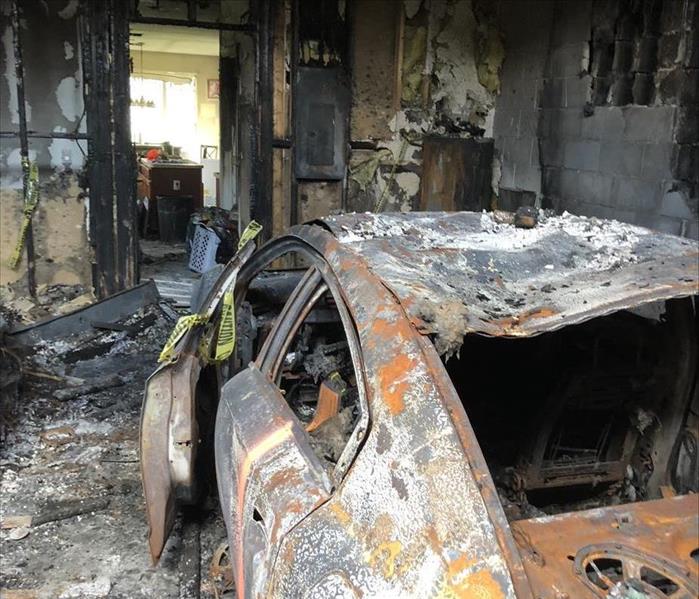 Fire Damaged Home and Burnt Car in a Garage
Fire Damaged Home and Burnt Car in a Garage
Introduction
You may have heard the expression "when it rains, it pours." Well, when you're staring at a flooded property with damage to your building's contents, that idea takes on new meaning. Running water can cause havoc in homes and commercial buildings alike. A minor issue like a slow drip from an overflowing sink or toilet can turn into tens of thousands of dollars in damages.
What to do when a property damage emergency happens
Most importantly, be sure everyone including your family and pets are safe. If the building is compromised, tell everyone to get out of the building immediately and call 911. Call our SERVPRO of North Atlanta team immediately at (404) 261-2925. Our IICRC approved technicians will arrive at your home or business within 2 hours for an immediate response, day or night! The sooner we arrive on-site the faster we can begin mitigating the damage.
Next, be sure to call your insurance company to explain the situation. This is the best way to get started with any potential claims process. Because of our deep restoration industry knowledge and experience, our technicians will be sure to document everything according to your insurance company's specifications.
How SERVPRO of North Atlanta can help you through a property crisis
If you find yourself in the midst of a building damage crisis, don't hesitate to give us a call. The sooner we respond and begin our mitigation tasks, the less expensive and more effective our service will be for you. Because our focus is property restoration, our teams are trained to assess any kind of property damage to quickly plan and execute an efficient and effective restoration strategy to protect and restore as much of your home, business, and personal belongings as possible. We employ IICRC certified technicians who understand your predicament and know how to quickly help get you back on your feet.
The benefits of working with our SERVPRO team
Working with our SERVPRO team means that you'll get the help you need to get your property back in proper working order faster. For example, here are several things that we do when you choose to work with our team:
Rapid, Advanced Structural Drying - We have the proper restoration equipment for ANY size property loss. From a single affected bathroom to a flooded or burnt 100,000+ sf industrial facility, our teams know exactly how to set up the right equipment at the right time.
Fire & Smoke Restoration - We eliminate smoke damage odors using industrial air scrubbers, fogging equipment, & several specialized cleaning compounds. Just ask us about our Ozone treatment! Whether it's smoke or fire damage in an apartment building or smaller scale of residential, workplace, or vehicle restoration needs, SERVPRO of North Atlanta is here to help and capable of it.
Mold Cleaning & Remediation - All molds are not created equal. SERVPRO of North Atlanta technicians know how to quickly and safely remove any mold species from your property. In many cases the affected area must be isolated, a containment system put in place, and special equipment brought out to assure that all mold spores are destroyed. Our team has the knowledge and experience to quickly stabilize any dangerous mold infestations.
Employee IICRC Training - SERVPRO of North Atlanta employees are trained and certified by the Institute of Inspection, Cleaning and Restoration Certification (IICRC). This is an international certification organization that ensures our technicians are qualified to serve you in your time of need the way you need it.
The Most Advanced Technology - Our cleaning and restoration equipment & supplies are top of the line. We utilize state-of-the-art technology to properly restore your home, office, or other commercial property back to preloss condition.
Emergency Board Up Services - In many cases it's necessary to board up a building that has been damaged by either a storm event, fire, or water. Our teams know exactly what needs to be done to protect your home or business from further damage.
Commercial Damage Restoration - If you're looking for an experienced commercial damage restoration company in Atlanta look no further! With our Disaster Response Team certification, we are one of the top 5 franchises in the number 1 brand in restoration. And we work hard to grow and maintain that reputation of excellence.
How we can help you get your life back on track after a property damage emergency
The fire, the flood, or the storm can leave you feeling overwhelmed and out of control. You need help now to get your life back on track as quickly as possible without having to worry about all the details. SERVPRO offers a range of services designed to help your property return to its preloss condition faster than ever before. And, our service is backed by decades of industry experience and advanced training in how best to restore business value after even the toughest property loss. No matter what kind of damage you're faced with (big or small) we are here for you!
If you hire SERVPRO of North Atlanta, you can trust that your property damage crisis is in good hands with our knowledgeable, highly trained technicians on the job. We'll work fast to assess the situation, establish what needs to be done (and how best to do it), and get your home or business back to its former glory.
Call us today to see exactly why SERVPRO of North Atlanta is the number 1 trusted property restoration team in:
- Atlanta, GA
- Sandy Springs, GA
- Buckhead, GA
- Buckhead Village, GA
- Peachtree Hills, GA
- Midtown, GA
- Vinings, GA
- Virginia Highlands, GA
- Chastain Park, GA
- Lindbergh, GA
- Paces Ferry, GA
- Tuxedo Park, GA
- Peachtree Battle, GA
- Lenox, GA
- Ridgeview Park, GA
24/7/365, We are Here to Help.
Deductibles and Storm Damage: Can You Claim Losses as Deductions?
2/2/2022 (Permalink)
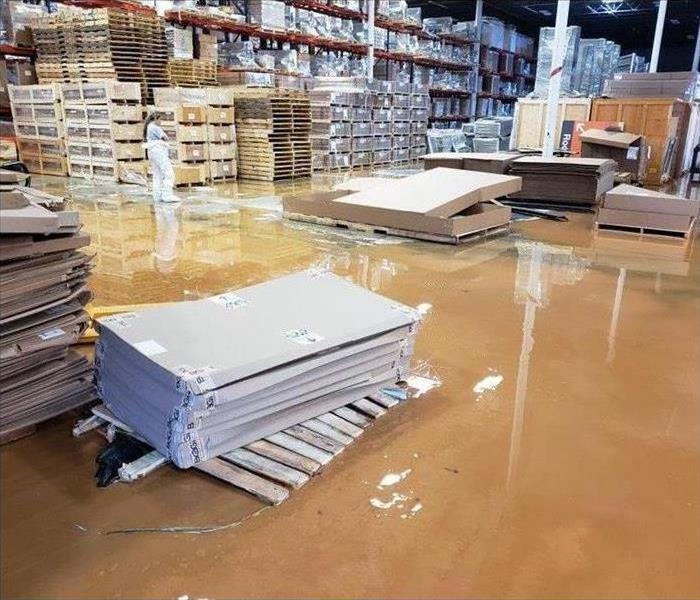 Storm damage can cause significant losses for a business.
Storm damage can cause significant losses for a business.
Deductibles and Storm Damage
Storm damage can cause significant losses for a business. However, the answer to whether those losses are tax-deductible or not depends on several factors, the biggest of which is whether items or potential claims are insured. There is a term, casualty loss, which refers to the sudden or unexpected loss of something due to an unusual or sudden event. These losses can be deducted; however, there are several stipulations that may prevent you from using this deduction.
1. Reimbursable Items
You likely cannot claim a casualty loss deduction for items that are considered reimbursable, meaning items that are already insured and protected from loss. Therefore, anything covered under your commercial policy cannot be used as a deduction.
2. Routine Use or Neglect
Also, claiming storm damage loss for items that were already beyond their expected life or not adequately maintained will likely not be accepted as a deduction. For example, claiming an HVAC unit, which has been on the fritz with no routine maintenance checks, has unexpectedly failed due to a storm is not likely to pass muster.
3. Business Interruption
A casualty loss deduction also cannot be applied to projected future profits, meaning that if a storm causes business interruption, you cannot claim a loss on those profits you expected during the shutdown. The reason is due to actual loss and predicted loss. Deductions work by proving actual losses, meaning proven losses. Projections of future income are not proof of that income.
4. Restoration Work
Additionally, a casualty loss deduction will likely not encompass the costs of restoration work unless the work is not covered by your business policy. You can contact your insurer or a disaster restoration specialist in the Peachtree Battle, GA, area to find out more information on coverage and payment options.
Storm damage is an unfortunate occurrence, but one that your business is hopefully protected against through adequate insurance coverage. If not, you may be able to claim a casualty loss deduction, but you will want to review the list above to ensure your deduction claim can make it through scrutiny.
3 Steps of the Fire Cleanup Process
1/21/2022 (Permalink)
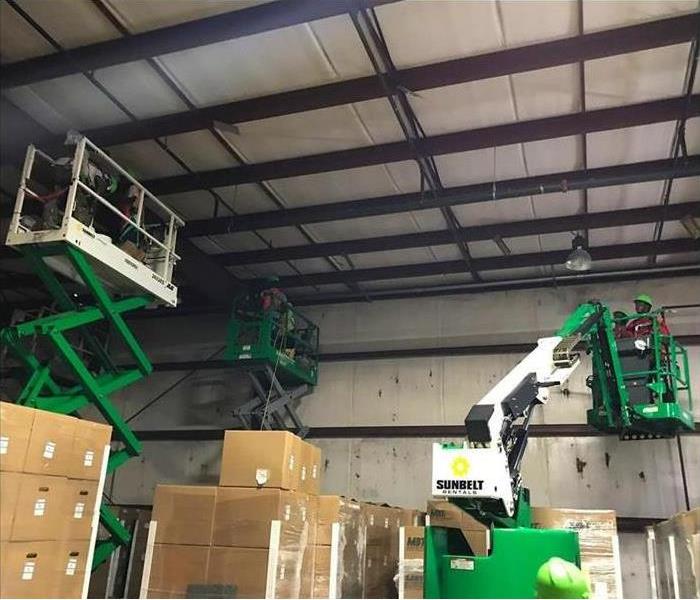 Fire cleanup experts in Paces Perry, GA.
Fire cleanup experts in Paces Perry, GA.
The Fire Cleanup Process
A fire in your commercial property in Paces Ferry, GA, can cause multiple kinds of damage to almost every part of the affected area. It is not uncommon for a building that has burned to have just as much water damage as smoke damage. You also may need to have soot removed, and there is likely to be an unpleasant odor throughout the space. It’s smart, therefore, to hire fire restoration specialists who are trained and certified to handle all the steps of the fire cleanup process.
1. Fire Damage Remediation
The first part of the smoke cleaning process usually starts with the structural damage caused not only by the fire but also by the water used to put it out. Experts may need to employ several techniques to fix your building:
- Extract standing water
- Remove damaged items, including walls, insulation, flooring and ceiling tiles
- Clean and dry the whole area
- Replace parts of the structure that were destroyed
- Match new parts to existing frame to restore the proper aesthetic
Once the smoke damage to the structure has been remedied, technicians can move on to ridding your property of soot.
2. Soot Removal
After a fire, every square inch of the space where it occurred is probably covered in a layer of soot. The tricky thing about these carbon flakes is that they are highly transferable, so experts must be careful to keep the area closed off. Safety gear is necessary during soot damage remediation so that it doesn’t come into contact with skin, hair and lungs.
3. Odor Elimination
Smoke can be pervasive. It can get into tiny cracks and crevices, so the odor tends to linger. An ozone machine that releases molecules that bond with and neutralize smoke particles may be used. Another popular technique is thermal fogging. This process works by heating up a deodorizing chemical and disseminating it in the same basic way the fire spread the smoke. Both methods can help get rid of smoke odor.
Smoke damage often requires professional restoration. Experts can make your building look "Like it never even happened."
The Three Categories of Water Damage
1/21/2022 (Permalink)
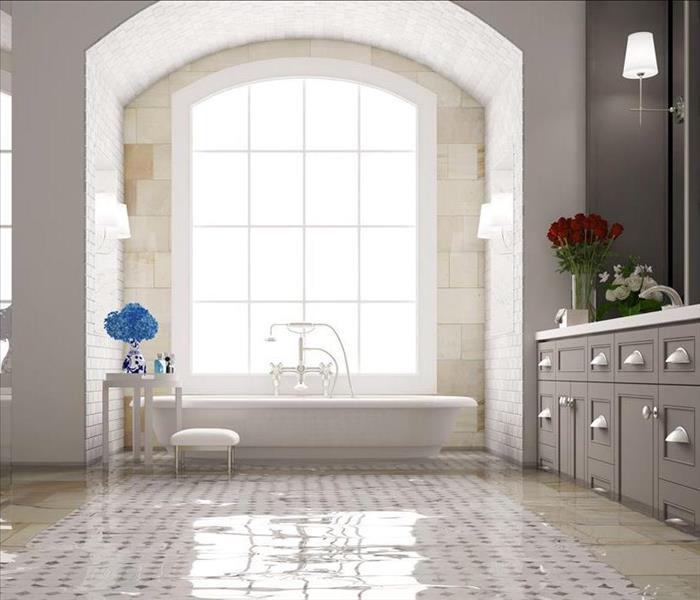 A bathtub overflowing is considered category 1.
A bathtub overflowing is considered category 1.
The Three Categories of Water Damage
Dealing with flooding in your home in Peachtree Battle, GA, can be one of the most difficult things imaginable. The first step involved in remediating the issue is learning what the three categories of water damage are. It is important to know what stage you are dealing with and the proper way to handle it, particularly if there is contaminated water. Here are the three categories.
1. Category 1. The first category of water damage is the least severe and the simplest to handle. It is caused by clean water that usually starts from a supply line that has broken, or from a bathtub or sink overflowing. This water is not contaminated. Category 1 can advance into category 2 and 3 if it is not promptly taken care of.
2. Category 2. The second category of water damage, frequently caused by what is referred to as grey water, is the result of contaminated water that can be harmful if you are exposed to it or it is swallowed. Some sources are a leaking dishwasher or a toilet with urine that overflows. There may also be microorganisms present.
3. Category 3. The third category of water damage, is the most severe. This water is extremely contaminated and unsanitary. Common sources are from flooding bodies of water, sewage or standing water that has been stagnant for long periods of time. This type of water is usually full of viruses, bacteria and parasites. You will need emergency water damage repair services as soon as possible.
Discovering flooding in your home can be overwhelming, especially if there is contaminated water. Understanding what the categories of water damage are is the first step to getting your home clean and returning it to a safe condition.
SERVPRO of North Atlanta/Buckhead - Proud to be awarded
1/19/2022 (Permalink)
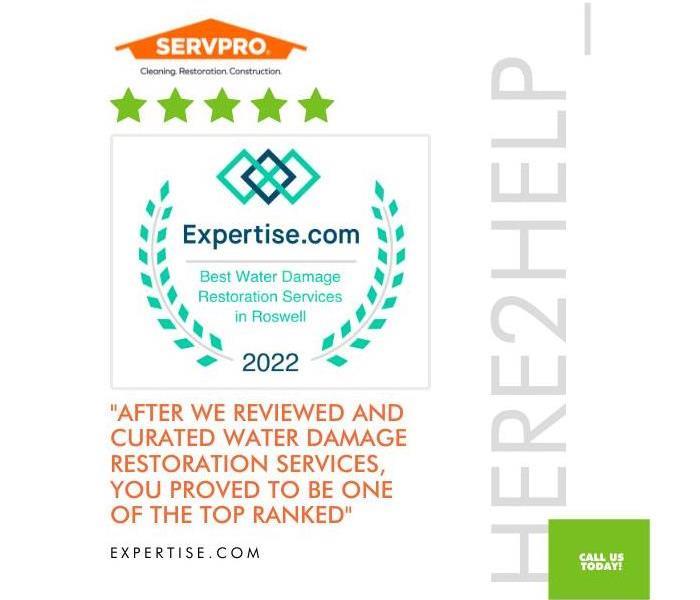 Expertise.com Award for Water Restoration Services
Expertise.com Award for Water Restoration Services
A water-related disaster in your home or business in Atlanta, GA is stressful, no matter the size. While you might hope that this would never happen to you, the truth is that it happens more than you think. If your home or business has ever experienced water damage or if you know someone who has, you’re likely well aware of how much damage even minor flooding can cause—and how long it can take to restore things back to normal.
The Award: Water Damage Restoration Services in Atlanta, GA
Our Water Damage Specialists use advanced water restoration techniques. So if you need help with everything from unclogging a drain, to restoring your home after a second-story toilet overflow, we have the capacity to do it. We specialize in removal and extraction, drying and dehumidification, cleaning and repair, and restoration services, for residential and commercial properties alike.
Our commitment to quality of service and workmanship has earned us an A+ rating from Expertise.com.
Water Removal and Extraction
When water damage occurs, it’s important to start by removing and extracting as much of that water as possible. If not taken care of quickly and properly, water can lead to more extensive – and expensive – problems later on. At SERVPRO of North Atlanta/Buckhead, we offer a variety of services that include water removal and extraction. Our teams can handle everything from small leaks in your basement or garage to large-scale disasters such as floods caused by storms, wind, or hurricanes.
Drying and Dehumidification
For a water damage restoration company, drying and dehumidification are crucial steps in a restoration project. If water is left sitting in a home or business, mold will begin to grow and spread—destroying walls, floors, and furniture in its path. Our SERVPRO of North Atlanta/Buckhead technicians make sure that atmospheric humidity levels are contained to 30-60% relative humidity and salvageable materials are dried and cleaned to preloss conditions before beginning the next steps in our water damage restoration process.
Restoration Services
Here at SERVPRO, we know that you don’t want to repair your home; you want it restored. Our water restoration technicians will work with you and your insurance company (if applicable) throughout every step of restoring your property to its preloss condition. We understand how stressful and frustrating water damage can be – but we also know that our dedication and expertise will help minimize stress and bring closure during a very difficult time in your life.
Call us today at (404) 261-2925 for 24/7/365 service. We are Here to Help.
Property Loss and Flood Damage: How To Make a Flood Damage Claim
1/12/2022 (Permalink)
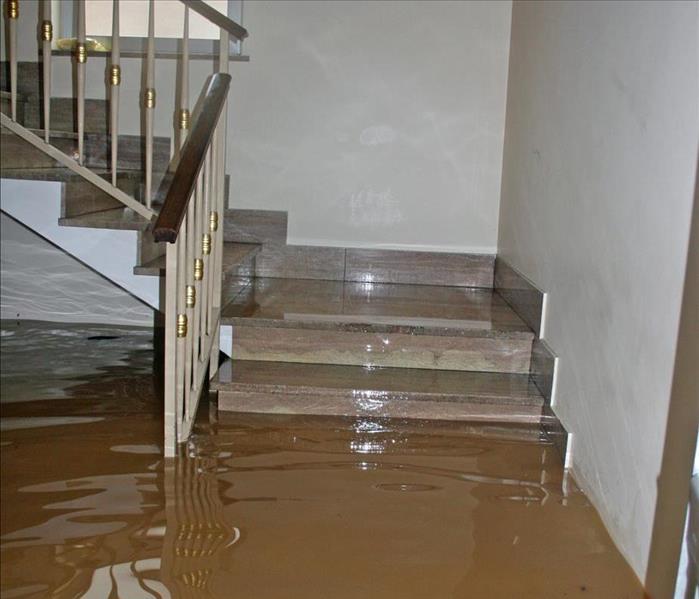 Flood damage in a Buckhead, GA home.
Flood damage in a Buckhead, GA home.
How To Make a Flood Damage Claim
A flood claim can be overwhelming since, at times, it follows in the wake of significant property loss. Thankfully, as insurers are at the tip of the bureaucratic food chain, there is a standard process to filing a claim, which should ease some of your stress.
1. Notify Your Insurance Provider
While the emotional response to a flood can be devastating and even mentally crippling, the first thing to do is notify your insurance provider. Notifying your insurance provider accomplishes two things:
- It begins the process of rebuilding your life and your property.
- It provides clear expectations of responsibility between homeowner and insurer.
After initiating contact, your insurer will likely schedule a visit from an adjuster to assess the damage to your property and to determine ultimate causality.
2. Document All Property Damage
The essential piece of any flood claim is the documentation of all property damage. True, the adjuster will take note of obvious property damage, but you will want to do your own walk-through and photograph any damage you see; not because adjusters aren’t trustworthy, but because you know your property better.
3. Compile and Complete a Proof of Loss Statement
An insurance claim typically requires a Proof of Loss statement, which is submitted within 60 days of the incurred damage. This document consists of your sworn statement, the claim amount, and any supporting proof or documentation. You can and should include any photographs and receipts in this file.
4. Collect Restoration Estimates
Once you have filed your claim and an adjuster approves further action, you can collect estimates for any necessary restoration work. Collecting estimates is as easy as calling a few emergency restoration companies from the Buckhead, GA, area and scheduling a visit. Once a list is compiled, you can present it to your insurer, and they will help you select the best option.
Flood damage is a nuisance, and it can be emotionally and physically exhausting sorting through the destruction. Fortunately, a flood claim is a predictable procedure with standard practices and steps that are typically followed by every insurer.
How To Deal With Smoke Damages From Adjacent Businesses
12/31/2021 (Permalink)
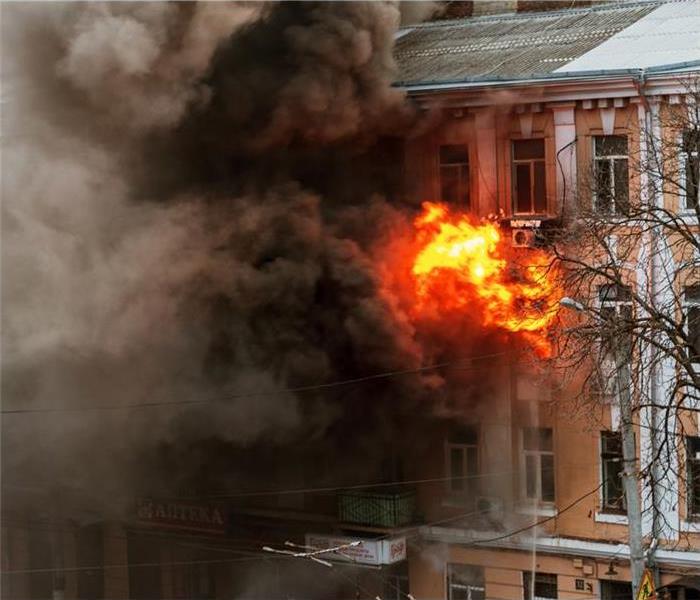 Fire and smoke damage to a building in Virginia Highlands, GA.
Fire and smoke damage to a building in Virginia Highlands, GA.
Even a small fire can cause a lot of smoke damage and those damages aren't just confined to the immediate building. If your commercial property has suffered smoke and/or soot damage because of a fire in the building adjacent to yours, there are steps you can take.How To Respond to Damages From Smoke
Begin by talking with your insurance agent to determine how damages will be covered. Smoke damage is commonly covered by most policies, and you can improve the strength of your claim:
Thoroughly document damages by noting the date of the fire, the types of damages and losses, any injuries, and descriptions of the damages. Add photographic evidence of the damages.
Understand that many of the items in your building may need to be thrown out and replaced even if they don't appear smoky.
Pay professionals to clean and restore your property. After you've thoroughly documented the damages, turn the rest of the work over to professionals. There are often hidden dangers and hazards associated with soot and ash. Smoke damage cleaning and reconstruction technicians have specialized equipment and gear to protect themselves and your belongings.
Consider talking to a public adjuster if the damage is severe. Insurance companies are often determined to pay the lowest about possible, but you may be eligible for a higher amount of reimbursement.
There are many factors that determine the extent of damage to your building when an adjacent property suffers from fire damage. Without the experience and knowledge that comes from dealing with many fire-damaged properties, it is possible to overlook problem areas or cause further harm when trying to handle smoke cleaning on your own.
Your First Response to Smoke and Flames
As soon as you notice a fire in a neighboring building, take steps to keep your employees and customers safe. Next, contact emergency authorities. When it is safe for you to return to your building, contact your insurance company and Virginia Highlands,GA, smoke damage cleanup and restoration professionals.
What To Do When a Sewage Backup Happens at Home
12/28/2021 (Permalink)
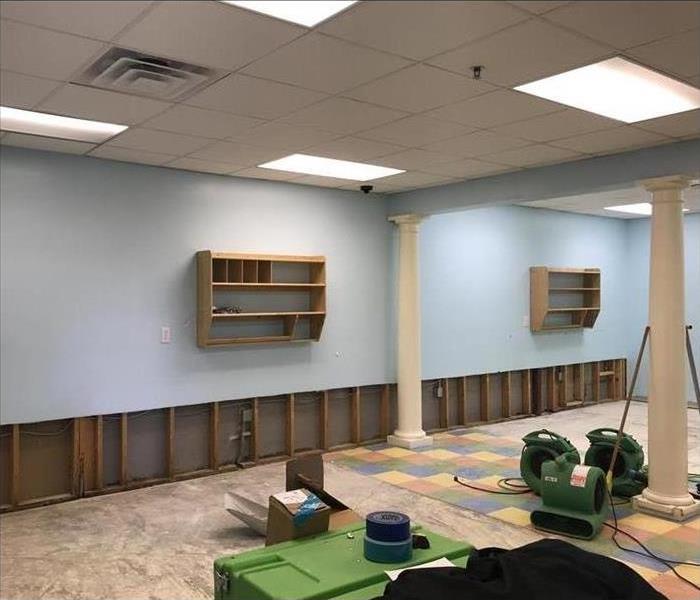 Disinfecting and drying are essential to restoring safe living conditions.
Disinfecting and drying are essential to restoring safe living conditions.
Steps For Managing Sewer Damage
There are certain things homeowners in Ridgeview Park, GA, fear, and one of the most formidable is dealing with a sewer backup. What homeowners may not realize is that sewer issues can mean more than just the inconvenience of a flooded toilet or an unusable kitchen sink. The presence of potentially contaminated water within your home poses a serious health threat. Sewer cleanup should always be handled carefully and swiftly. Here are three steps for managing sewer damage.
1. Treat Sewer Problems As an Emergency
Coming into contact with any form of sewage can be dangerous, and you should assume that all water is contaminated, even if it appears clean. In the event that sewage enters your living space, time is of the essence. It is important to begin the sewer cleanup process immediately.
2. Disinfect and Dry
Disinfecting and drying are essential to restoring safe living conditions. Begin by getting rid of all solid and liquid waste. Be sure to remove and clean any wet carpeting or fabric. Afterward, sanitize and dry the affected area. Experts can help provide a more thorough cleaning by using advanced technology to detect water that may not be readily visible.
3. Repair Any Damage
Once the space is clean and dry, replace any damaged materials such as flooring or wallboard. Always repair saturated or decaying building materials after a flooding incident in order to avoid mold or other contaminants.
Dealing with water damage is never fun, but if attended to promptly, sewer cleanup can be done safely and effectively. When a sewage disaster strikes, it is crucial not to delay. Whether it is the middle of the night or a holiday morning, water damage restoration specialists are available 24/7, year-round to help you restore the cleanliness and comfort of your home.
Fire Hazards in Commercial Office Buildings and Tips to Prevent Them
12/23/2021 (Permalink)
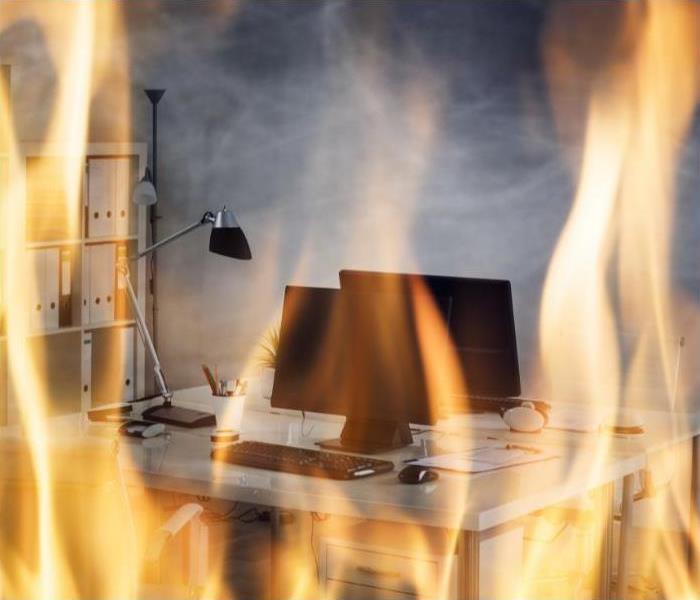 Office Fire
Office Fire
Our homes and our businesses in Atlanta or Buckhead are our castles, which is why we work hard to make them as safe and secure as possible. Unfortunately, there are some hazards that may not be obvious and can cause damage to your office, in the form of fire or water damage. Even more unfortunate? The cost of these damages, which could run into the thousands of dollars, and can come out of your pocket—whether you’re an individual homeowner or a business owner or landlord. Here are some common causes of fire and water damage in commercial office buildings, as well as tips on how to prevent them from occurring and damaging your home or commercial property.
Understanding Building Fire Damage
Most office building fires are small. But even a small fire can do a lot of damage if it gets out of control or isn’t contained early on. One of the biggest dangers is smoke and fire damage to your home or commercial office's interiors. Smoke can permeate materials, carpets, walls, flooring, ceilings—even drywall joints—leaving hidden danger behind long after flames have been extinguished. Even if you can’t see any visible signs of fire or smoke damage, you should always have an experienced professional examine your property for lingering toxins from before you move back in.
According to this report by the NFPA, there are 7 main causes of fires in commercial office buildings. Cooking Equipment, Electrical distribution and lighting equipment, heating equipment, intentional damage, smoking materials, exposure to other fire sources, and electronic, office, or entertainment equipment. This statistic includes general business offices, banks, veterinary or research offices, engineering, mailing firms, and post offices.
Common Causes of Commercial Building Fires
Most office fires are caused by cooking equipment, accounting for slightly over one in every four commercial office fires. However, while these fires are the most common, they do not account for most of the property damage to office buildings. That position is taken by the intentional damage category. Intentional damage alone accounts for a full 20% of commercial fire property damage. Intentional Property Damage occurs when a person seeks to purposely damage the office property through arson.
Two other leading causes of fire in office buildings are heating equipment, electrical distribution, and lighting equipment. Together, they account for 18% of property damage to commercial office buildings. These can include things such as space heaters, light fixtures, electrical wiring, outlets, electrical appliances, extension cords, and more.
While lower on the list, smoking materials, electronic, office, or entertainment equipment account for 12% of commercial office property damage.
Lastly, exposure fires, as defined by the National Fire Incident Reporting System (NFIRS), are fires resulting from another fire outside of the commercial building itself. This kind of commercial fire damage accounted for 18% of property loss.
What Can I Do To Prevent A Building Fire?
If your building was constructed with modern building materials, fire damage should be a rare occurrence. But it can still happen if you’re not careful. Make sure all smoking materials are safely extinguished before leaving work each day. A smoldering cigarette can ignite more easily than you think. Also, make sure to regularly inspect your smoke alarms, carbon monoxide detectors, and fire suppression systems to ensure they’re working properly. If a smoke alarm goes off for no reason at all, make sure to replace or recharge its batteries immediately.
The NFPA uncovered another intriguing statistic about fires on weekends and between the nighttime hours of 7 pm and 7 am. 19% of fires occurred on weekends but accounted for 31% of fire-related property losses. Meanwhile, fires at night accounted for less than one-third of office property fires, yet caused 67% of direct property damage due to fires.
Automatic Fire Detection & Fire Extinguishing Systems:This shows that one of the most important steps you can take towards protecting your office building from fire damage is to install and maintain automatic detection and fire extinguishing systems.
Camera monitoring systems such as those installed by videosurveillance.com or Pelco would be best for large-scale commercial properties. Otherwise, self-installed solutions such as those recommended in this article by PC Mag will work well.
For fire suppression systems, the best solution is to pay a proper fire protection services consultant such as Fire Protection Services LLC. Make sure to ask them to help you develop and implement a fire suppression system maintenance plan.
Cooking Equipment Fire Prevention: The best way to prevent fires with cooking equipment is to train your staff properly in its use, cleaning, and maintenance. For more on cooking equipment fire prevention, be sure to refer to our article on reducing the risk of commercial kitchen fires here.
When it comes to electrical distribution and lighting equipment, there is a multitude of reasons why fire may start. But according to this article by firerescue1.com, faulty outlets or appliances, light fixtures, extension cords, space heaters, and wiring issues were the 5 most common electrical fire causes.
Electrical Hazards Fire Prevention: To prevent faulty outlet or wiring fire hazards, the first step is to make sure to have a certified electrical contractor or property inspector review your commercial property before purchase. Even if you or a tenant are already occupying your commercial office space, a proper inspection by a certified electrical contractor to ensure code compliance of all building materials and installations will protect you from potentially expensive fire repairs. This is especially important to protect you from having to pay for potential property damages out of pocket.
To protect your commercial property from fire damage due to light fixtures or extension cords, the most important tip is to ensure you follow the manufacturer's maximum recommended wattage and amperage guidance.
A good rule of thumb for selecting an extension cord is the smaller the wire gauge rating, the greater the capacity. According to this article by the Spruce, 12-gauge extension cords can handle up to 1920 watts (16 Amps), 14-gauge cords can handle 1440 watts (12 Amps), 16-gauge can handle 840 Watts (7 Amps), and 18-gauge cords 600 Watts (5 Amps). In addition to wattage capacities, another thing you should look at when choosing a commercial electrical power solution is cord lengths. The longer the cord, the more important it becomes to have a higher wattage extension cord.
For light fixtures, you should follow manufacturer guidelines to prevent property fire damage. However, what you should look out for are potentially dangerous light bulb wattages and materials around your lighting fixtures that could catch fire. High-wattage incandescent bulbs installed on light fixtures that are rated for lower-wattage bulbs can spark flames because of overheating. Also, keeping flammable materials around light fixtures, or allowing dust buildup increases the risk for fire damage.
Call SERVPRO of North Atlanta to Restore Commercial Fire Damage
We hope these tips are useful to help you protect your commercial property from fire damage. In case you experience a property loss in your commercial office building or commercial property, our team at SERVPRO of North Atlanta is available to help 24/7/365. Call us today at 404-261-2925 for rapid assistance.
Accidental Fire Sprinkler Discharge
12/23/2021 (Permalink)
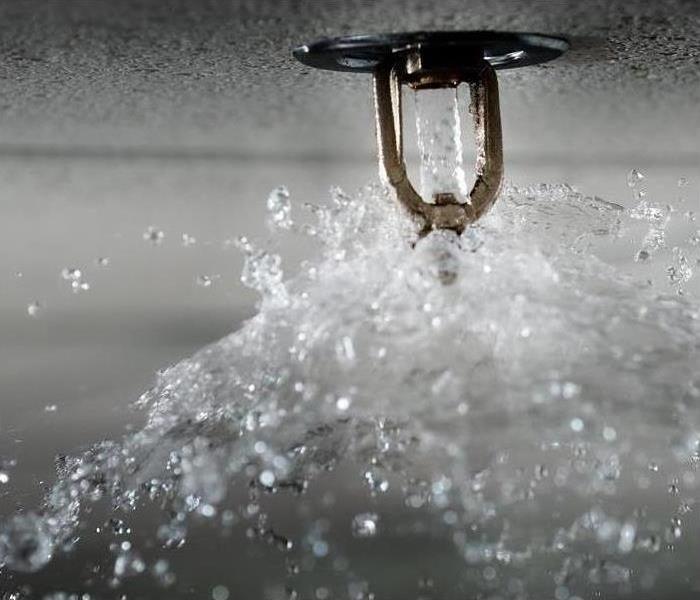 The accidental discharge of a fire sprinkler can cause devastating levels of damage.
The accidental discharge of a fire sprinkler can cause devastating levels of damage.
Fire Sprinkler Discharge
In 20 minutes, a single fire sprinkler can spray hundreds of gallons of water onto a fire or just onto your most important documents and equipment, flooding the office. It’s certainly not action movie common in Sandy Springs, GA, but overhead sprinklers do get discharged when fire is not involved. If it happens to you, take these steps:
1. Turn Off the Water Fast
This seems simple, but it may require planning. First, if you are the responsible party working at a property, you need to know where the water shut off is. That is information you should find out ahead of time, especially if you or others working on the property are working near the sprinklers or carrying items that could hit a sprinkler.
Secondly, if you have employees working at your property, they need two things: an emergency plan that includes detection of accidentally discharged fire sprinklers and knowledge of the location of the water shut off valve. This is particularly important if you are not regularly onsite. If your employees wait for the fire department to handle the sprinklers, the flooding could be extensive.
2. Call Your Insurance Company
It may be tempting to wander into the wetness and start deciding what’s what, but it will probably save time in the long run if you let your insurance company make decisions and follow its directions. It'll most likely want to investigate the situation without any extra considerations. If there is something you want to do before someone from your insurance company arrives, just check with your insurer ahead of time.
3. Hire Restoration Services
You should have approval from your insurance company before you choose a water damage restoration company. A quality restoration job will put your property back together like the water damage never happened.
The accidental discharge of a fire sprinkler can cause devastating levels of damage. However, the faster the sprinkler gets turned off, the less flooding and other damage there will be. Following the directions that your insurance company gives you will help you get back in business in a dry and restored office.
What Should You Do to Reduce the Risk of a Commercial Kitchen Fire from your Cooking Systems?
11/29/2021 (Permalink)
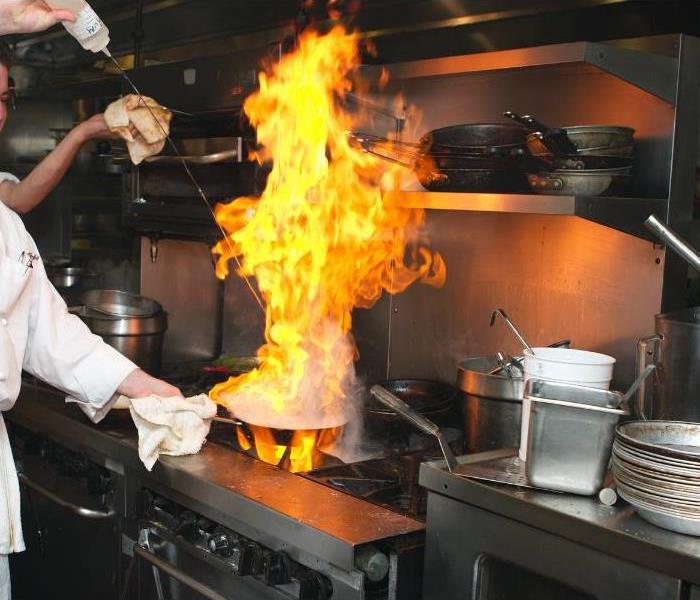 Commercial Kitchen Fire While Cooking
Commercial Kitchen Fire While Cooking
Attention all restaurant and bar owners in North Atlanta & Buckhead: The National Fire Protection Association (NFPA) reports that fire departments responded to over 7,410 structure fires in the kitchen of restaurants and bars in 2017 alone. The majority of these fires were preventable, resulting in three deaths, 110 injuries, and $165 million in property damage annually in commercial kitchens. Not only do kitchen fires threaten the lives of staff and patrons, but they also put restaurants at risk of being shut down due to fire code violations when repairs are needed after a blaze.
What Are My Ducting and Air Movement Requirements to Prevent Fire?
While Chapter 7 of the NFPA 96 Standard for Ventilation Control and Fire Protection of Commercial Cooking Operations covers this extensively, here are a few key items to keep in mind.
First, commercial kitchen ducts should never pass through firewalls, share an exhaust system with the building ventilation, or have obstructed access panels. While doing these things on a commercial kitchen remodel can save costs in the short term, the fire risk increases significantly. If disregarded, your commercial kitchen work will likely not pass inspection.
Make sure to maintain a minimum clearance of 18 inches between combustible materials and the kitchen ducts. This standard is based on Section 4.2 of the NFPA 96, however is one of the easiest to disregard once the kitchen is operational. Ducts can build up high levels of radiant heat that can ignite combustible materials like boxes, cups, plates, utensils, or other kitchen materials.
If you would like additional information on the types of combustible and non-combustible materials that should and shouldn't be kept near the duct, consult Chapter 3 of the NFPA.
What Are My Commercial Kitchen Fire Extinguisher Requirements?
"The NFPA 96 requires automated fire suppression equipment for all grease removal devices, hood exhaust plenums, and exhaust duct systems in a commercial kitchen, as well as any cooking equipment that produces grease-laden vapors." - Koorsen Fire & Security
The NFPA 96 requires use of class K fire extinguishers in conjunction with automatic fire extinguishing systems. These extinguishers also require installed placards stating their extinguisher class. However, in the case of a commercial kitchen fire, it's critical to activate the automatic fire extinguisher system before using portable-type extinguishers. This is because high-efficiency cooking appliances in many modern commercial kitchens are capable of achieving high temperatures that can raise the vegetable oils to intensely high temperatures. When oil ignites at these high temperatures, it can already be so hot that a portable extinguisher is not enough to stop the flames.
Another standard that you should familiarize yourself with is the UL 300 standard.
According to this article by Insureon, a kitchen’s cooking equipment must meet these UL 300 requirements:
- Fire-extinguishing nozzles in the hood, ducts, and above each cooking appliance
- An automatic fuel shut-off capabilities for both gas and electric power sources
- A manual fuel shut-off pull for all power sources
- A wet-chemical fire-extinguishing system that meets UL 300 criteria (one of which is undergoing semiannual checkups by a certified professional)
Practice Proper Maintenance & Inspection in Your Commercial Facility
The first step towards proper maintenance to prevent a commercial kitchen fire in your facility is to create a regular plan for inspections. While you can do these yourself, it is often a good idea to consider outsourcing this service to a proper NICET Certified Fire Inspector. Depending on the volume of cooking in your commercial kitchen, they will likely recommend monthly, quarterly, or annual inspections to ensure compliance and safety.
On regular inspections, fire inspectors will provide the best guidance on where you should focus your team's routine maintenance time and resources. Ultimately, it is up to you as an owner or manager on how closely you implement those recommendations.
Typically, at least the vent, hood, and duct must be cleaned regularly to remove grease vapor and prevent combustible material build-up. Grease Filters should be cleaned at least once per week, and your automatic fire suppression system should be inspected at least every 6 months or as required by your local regulations. Regular cleaning according to equipment specifications should be observed as well.
What To Do If There Is a Fire In My Commercial Kitchen?
If you can, get everyone out safely. If you have an outdoor exit, have people leave that way. Do not open any interior doors or windows or use elevators during a fire. Even if it seems like it’s far away, do not stop to pick up personal belongings. Unless it’s your home, never go back inside during or after a fire. Once you are safe, call 911 immediately and stay on the line until help arrives. Once firefighters arrive on the scene they will assess if there is still a risk for injury within any structure fires before allowing you to re-enter your building.
Next, you should call a fire restoration expert like SERVPRO of North Atlanta to help you quickly restore your commercial kitchen to an operational state.
Our trained technicians are available 24/7/365, and ready to help. We also offer a special Emergency Response Plan to commercial facilities to reduce property damage in the case of an emergency commercial fire event. Call us today at (404) 261-2925 for emergency services or to schedule your free SERVPRO ERP.
How Do I Create a Business Continuity Plan?
11/29/2021 (Permalink)
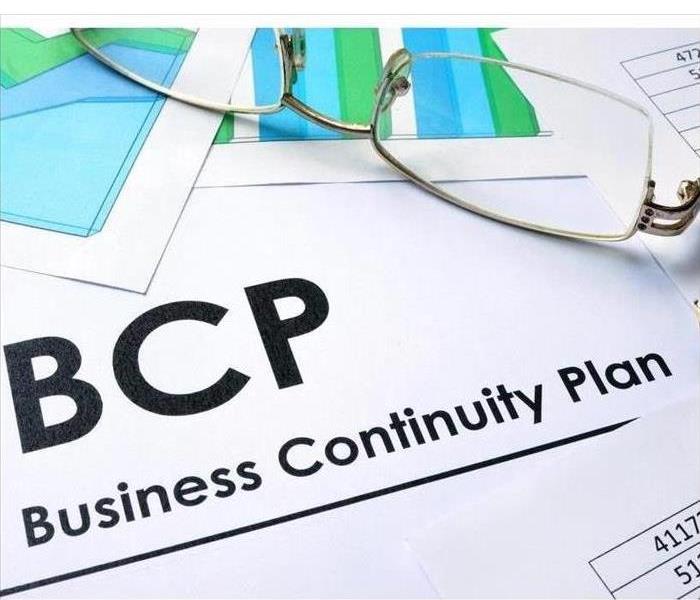 A business continuity plan helps you protect your employees and assets during a stressful time.
A business continuity plan helps you protect your employees and assets during a stressful time.
Planning for an emergency saves time and money. Having insurance to help cover expenses after a disaster is one step. Putting together a business continuity plan gives you an outline to follow to keep your business moving forward.
What You’ll Need
An emergency response plan for your business includes thinking about managing assets such as the following during a disaster:
- Employees
- Buildings, equipment, and furniture
- Computers, printers, phones, and other technology
- Inventory (raw materials, finished product, paper goods)
- Important paperwork and records
- Information about utilities, including phone numbers and account information
Ready.gov has tools to help you create a business continuity plan. You also may want to include your insurance policy number and the contact information for a disaster recovery company in Vinings, GA, in your worksheets.
How To Plan
Create a business impact analysis. Identify how your business would be affected by an emergency. Think about decreases in sales and income, increases in expenses, and loss of customers. You’ll get a better picture of which important processes need to keep going no matter what.
Since so many businesses depend on computers, it’s vital to plan for your business to be able to run offline. You’ll want to access your servers and software, so think about how you’ll recover information if you can’t reach your network.
Consider what will happen if you need to move your business or have your employees telecommute. If you’re in manufacturing, think about having access to equipment in a different location. Some companies make agreements with other organizations so they can support each other during a disaster.
Finally, put together a team to guide the emergency response plan during a disaster. Train your team on any procedures and have them practice to see if there are any issues with your strategy.
Catastrophes can strike at any moment. A business continuity plan helps you protect your employees and assets during a stressful time.
What To Do When You Smell Natural Gas
11/29/2021 (Permalink)
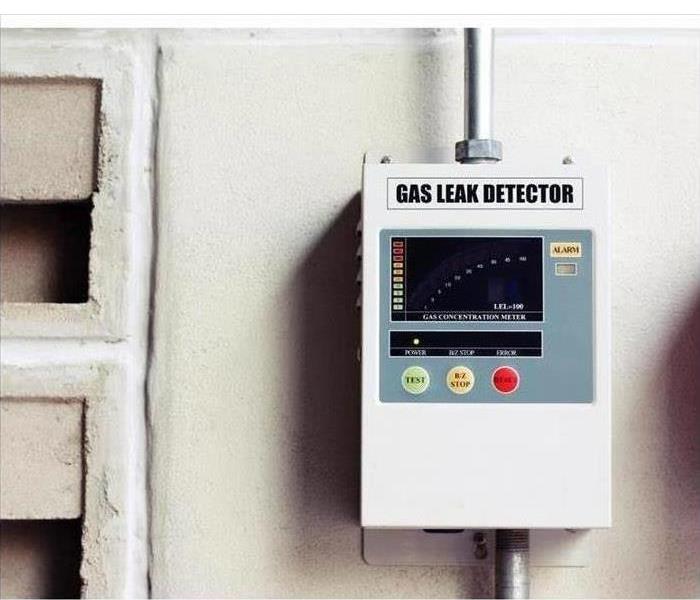 Make sure you know how to work the meter, so you can shut it off if you suspect a gas leak.
Make sure you know how to work the meter, so you can shut it off if you suspect a gas leak.
What To Do When You Smell Natural Gas
Many Buckhead, GA, homeowners use gas of some kind to run their heaters, warm water, clean clothes, or cook meals. Unfortunately, a gas fire at home is more common than you might think. These explosions may be caused by
- Improper installation of gas lines and appliances
- Defects in appliances
- Improper use of gas appliances
- Incorrectly turning gas appliances on or off
When natural gas comes into contact with a spark, an explosion will occur. This spark could result from something as simple as flipping on the light switch. If you notice the telltale rotten egg of gas or hear a hissing sound, there are several things you can do to avoid a gas explosion.
Know Where the Gas Meter Is Located
This meter is usually located outside of your home. Make sure you know how to work the meter, so you can shut it off if you suspect a gas leak. You may need a wrench to move the valve from its on and off positions. If possible, store a wrench so that it's convenient to use during an emergency.
Don't Turn Anything On or Off
If it's plugged in or uses electricity, don't turn it on. One tiny spark is all it takes to ignite the mixture of gas and oxygen. If you have a flashlight convenient, you can use that to safely light your way out of the home.
Check the Stove
If you aren't at risk, check the stove to be sure that all burners are off. One common cause of gas leaks in the home happens when someone bumps into the stove and doesn't notice that the gas has turned on. If the gas is on, turn it off and open windows to ventilate the home. If it isn't on, open the doors and windows and evacuate right away. Contact the gas company immediately.
It is possible to avoid the risk of a gas fire in your home, especially when you're aware of the situations that cause this type of explosion. If you want to know more about avoiding fire damage and keeping your home and family safe, reach out to local authorities, such as property damage cleanup and restoration experts.
Tips to Prevent a Christmas Tree Fire
11/18/2021 (Permalink)
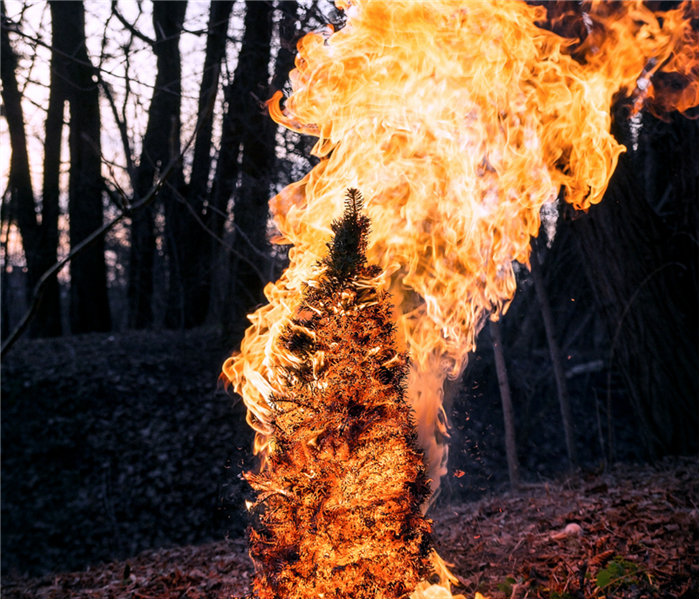 Keep your Christmas Season Fire Damage-Free with these tips!
Keep your Christmas Season Fire Damage-Free with these tips!
Christmas is almost here! If you’re planning on putting a natural Christmas tree in your home in Buckhead, GA, here are some quick tips to be fire smart and protect your home from Christmas tree fire damage. From keeping candles out of sight to using holiday decorations safely, your home will be protected from potential fire damage with these five tips to prevent a Christmas tree fire in your home this year.
The Facts, Christmas Tree Fire Hazard
Did you know?
According to research by the NFPA, "From 2014 to 2018, US fire departments responded to an estimated average of 160 home structure fires per year that began with Christmas
trees. These fires caused an annual average of two civilian deaths, 14 civilian injuries, and $10.3 million in direct property damage." With these tips, you'll make sure to enjoy your Christmas without worrying about needing fire restoration work. However, in case you do need us, SERVPRO of North Atlanta is Here to Help.
Pick the Right Tree to Prevent Fire Damage
A natural Christmas tree can be a beautiful and festive addition to your home, but it also carries an added risk: If not properly maintained, there’s a chance it could ignite. To prevent fire damage from occurring, choose one that is fresh and has been recently cut. Some trees tend to be drier than others; you may want to avoid pine or spruce trees, as these are often drier. Fir Trees tend to stay fresh the longest.
Try to find a fresh tree by doing the "needle drop" test. With the tree upright, lift it then drop it on the ground a few times. If a lot of needles fall off, then the tree might be dry enough to become a fire hazard. Trees with sticky tree trunks also tend to be fresher than others with dry trunks.
Tree Placement to Reduce Fire Risk
After buying your tree, it's important to prepare it to last the whole season. Do this by first cutting the base 2" of the trunk and placing it in a tree stand with water. Try to keep the tree watered daily so it stays fresh for as long as possible.
When finding a perfect place for your tree and presents, make sure that your tree is kept away from any heat sources, including lamps and fireplaces. Also, try placing it near an outlet; you don't want to accidentally cut off power during decorating! Keep it at least 3 feet away from a fireplace, radiator, heat vents, or other heat supply. With too much heat, a live tree can quickly dry up and raise the risk of fire damage.
Lighting Your Tree Safely
Natural Christmas trees, like any tree, are flammable. Even trees that have been coated with fire retardants can burn down your home if you aren't careful while decorating. Use only lights that are listed by a qualified testing laboratory, such as Underwriters Laboratories (UL for short). Avoid putting lit candles on or near your tree. Ideally, avoid using flammable decorations, such as tinsel.
Use flame-retardant or LED lights instead of regular bulbs. If you have any worn or broken cords, it is best to replace damaged strings of lights rather than risk fire damage to your home. If you plan on using an open flame around your tree, make sure it's placed at least 3 feet away and never leave the house or go to sleep with lights connected to power and unattended.
With these tips in mind, your Christmas can be safer and fire damage free. However, if things go wrong and you need help repairing your home or business after a fire loss, SERVPRO of North Atlanta is Here to Help.
Call us at (404) 261-2925 for immediate assistance. Our teams of experience fire restoration technicians are available 24/7/365.
Combatting the Perils of Candles
11/10/2021 (Permalink)
 Finding good candle alternatives can reduce the chances of a fire breaking out.
Finding good candle alternatives can reduce the chances of a fire breaking out.
Candle Alternatives
Unattended candles are a common cause of house fires in Buckhead, GA. Most people do not realize how dangerous this household item can be. You can combat the potential perils by using candle alternatives, practicing fire-safe methods and knowing what to do in an emergency situation.
Alternatives
Rather than using a product you know can be dangerous, it is often better for you to turn to a flameless alternative. Common products that can replace these popular home pieces include the following:
- Essential oil diffusers
- Candle warmers
- Air fresheners
- Reed diffusers
- String lights
Candles usually do two things for your home—provide lighting and a pleasant smell. Some of the alternatives can either add light to a room or improve the aroma. You may want to incorporate multiple alternatives to achieve the same effect as candles.
Fire-Safe Methods
Using candle alternatives isn't the only way you can combat the perils of this small open flame. You should also put fire-safe methods in place whenever you light a wick. This means keeping candles a safe distance away from paper materials and only lighting them on a level, hard surface. You should also always remain in the room while a candle is burning. If you think you might fall asleep, you should blow the flame out first.
Emergency Plans
If a candle fire does break out, you need to act quickly to remediate the situation. You should try to put out the fire if it is safe for you to do so. If the fire ravages a part of your home, you should call in a residential fire cleanup professional to help you get your house back to normal.
Because candles can provide a nice ambiance for a home, many homeowners choose to use them throughout the space. Finding good candle alternatives can reduce the chances of a fire breaking out. However, you need to remember to use fire-safe methods if you ever do use a traditional candle.
How to Remove 2 Feet of Water From a Garage
11/10/2021 (Permalink)
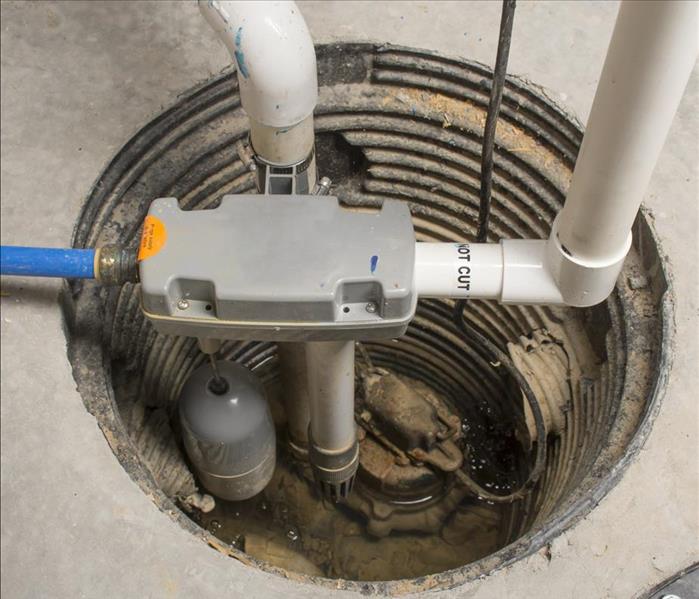 Sump pumps can be ideal for commercial garages.
Sump pumps can be ideal for commercial garages.
Three Different Types of Pump That Can Remove Water From a Garage
There are several equipment options for extracting two feet of water from a commercial garage in Paces Ferry, GA. Learn about the differences between sump, trash, and truck-mounted pumps, and determine which of these three pump designs could be the best choice.
1. Sump Pump
A submersible industrial pump is a portable solution for removing flood water. These pumps draw water into a tank or container. Sump pumps can be ideal for commercial garages that are not convenient to access with a truck-mounted pump. These pumps may have bilge and ballast, centrifugal, or cantilever designs.
2. Trash Pump
Trash pumps are better suited for pumping up thicker liquids containing mud, silt, and debris than a sump pump or pump truck hoses. These pumps are typically heavy-duty centrifugal designs with deep impeller vanes and large discharge openings. A strainer on the end of the pump ensures that this equipment does not suck up debris that is much larger than leaves or twigs.
3. Truck-Mounted Pump
A pump truck is another portable solution for extracting standing water. This truck relies on industrial hoses to suck up water from a commercial garage or any other flooded location and transports this water to an appropriate disposal facility for black water from a flood. These pumps are particularly used for extreme flooding situations, and may be ideal for dealing with two or more feet of standing flood water.
These three pump solutions can remove standing water from a garage. The right pump depends on the accessibility and location of a garage as well as the quality of the flood water. While all flood water is considered Category Three black water, a large amount of debris or silt may call for a trash pump. Find out which pumping equipment is right for the job by scheduling a consultation with a storm damage restoration service in Paces Ferry, GA.
Tips for Preventing Pipes from Freezing & Cracking This Winter
11/5/2021 (Permalink)
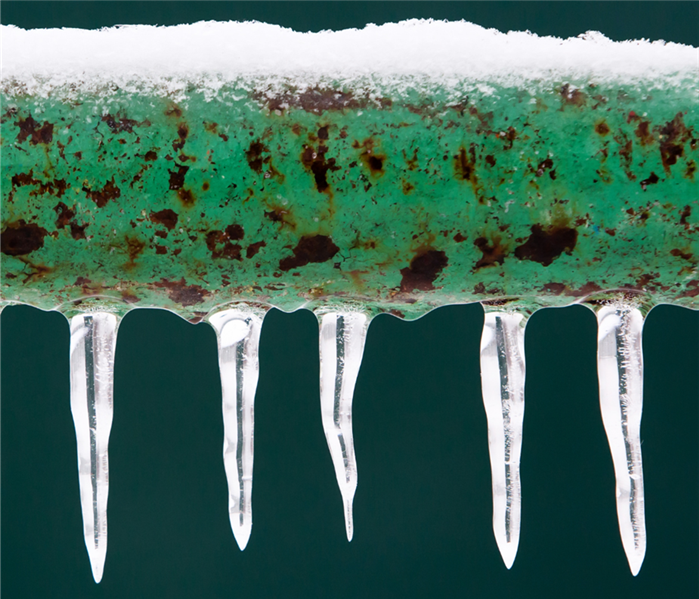 Frozen Water Pipe in the Winter
Frozen Water Pipe in the Winter
When temperatures drop into the 20s, water can freeze inside your home’s pipes. If that happens, your pipes can burst, causing flooding and water damage to your home when they defrost. Take these steps to prevent this from happening to you during the colder months of the year.
Why Do Freezing Pipes Burst?
First of all, it's important to understand why freezing causes pipes to burst in the first place. Because water expands when temperatures drop below 32 degrees, ice crystals begin to form inside your water lines. As the water pressure increases, if these ice crystals grow big enough (which happens over time as the weather grows colder), they can make your pipes expand. This puts pressure on water pipes which eventually -- if left untreated long enough -- causes ruptures.
Freezing Pipes Prevention
The first rule of thumb to prevent freezing pipes is to understand at what temperature they can begin to freeze. According to research by the Building Research Council at the University of Illinois, uninsulated water pipes begin freezing when the temperatures outside drop to 20 degrees or below.
If possible, the best way to prevent freezing is to turn up the heat with a space heater or on your thermostat. However, if you can't raise the temperature artificially, then be sure that any exposed pipes are well-insulated. You can insulate your pipes by wrapping them in foam pipe insulation, which is available at most hardware stores.
Consider leaving all interior doors open and cabinets slightly open to make sure the warm inside air can regulate the temperatures inside properly. If any pipes are in the walls, this method helps protect them from freezing.
If you'll be traveling, but you're concerned about freezing pipes, be sure to leave your faucets slightly dripping. This water flow helps prevent the buildup of ice crystals in your water pipes. However, if you'll be gone for long periods of time, it's a good idea to shut off your water completely.
Are Frozen Pipes Covered by Insurance?
Most homeowner and commercial property insurance policies, in general, will cover damage from a frozen pipe that bursts. Coverage usually exists if the policy contains the following or similar language: Coverage is provided when it is determined damage resulted from a “sudden and accidental” discharge from a plumbing source or system (please check your policy or ask your insurance provider for the exact language).
However, your insurance policy may not respond if you did not take the proper precautions on your property first. Follow the tips in this article, and discuss coverage with your insurance provider to protect your home.
And, in case your home's water pipes do burst this winter, SERVPRO of North Atlanta/Buckhead has the team and experience to quickly make your home "Like it never even happened."
Call us today at (404) 261-2925 for immediate assistance 24/7/365.
Understanding Your Mold Coverage
10/27/2021 (Permalink)
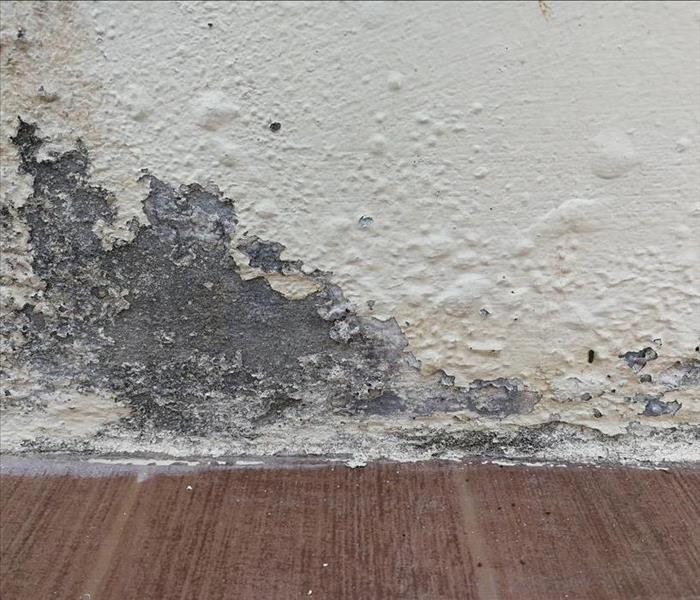 Mold growth in Virginia Highlands, GA.
Mold growth in Virginia Highlands, GA.
Understanding Your Mold Protection
You purchase insurance for your home in Virginia Highlands, GA, to protect it and save yourself the cost of repairing damages. Mold issues can lower property value and even make a home almost impossible to sell. Most homeowner’s policies, however, do not cover the services of mold remediation specialists. Even if your policy does offer some type of mold coverage, there is usually a pretty low cap to the amount of your potential payout. Since fungus growth can often be prevented, its presence tends to be seen as more the fault of the homeowner than as a circumstance beyond one’s control.
Mold Prevention
Even if you have mold insurance or a policy that includes mold remediation, you need to be able to prove that you have done everything to prevent the problem from occurring. You can protect your home from mold simply by following some key prevention tips:
- Check indoor water sources for leaks frequently.
- Fix problems you find immediately.
- Lower the humidity of your home.
- Watch for condensation or standing water.
- Ventilate bathrooms, laundry rooms and attics appropriately.
Guarding against excess water can inhibit fungus growth and thereby decrease the need for an insurance policy that covers it. Prevention is the best way to protect your home in Virginia Highlands, GA, from damage caused by mold.
Mold Coverage
An extensive mold problem can appear quickly, but there are usually extenuating circumstances that lead up to it, making it difficult to get insurance to cover the cost of remediation. Any problem that could have been foreseen or halted at its early stages is less likely to warrant an adjuster’s approval. If you believe that your mold issue is an exception, it is a good idea to enlist mold remediation technicians to back up your reasoning when the adjuster arrives.
No one likes to see fungus growth in their homes, nor does one like the bad news that it probably won’t be something their insurance covers. With proper prevention techniques or the expert opinion of a certified technician, you may be able to avoid the high out-of-pocket cost of mold remediation.
How To Maximize Recovery After a Partial Loss
10/27/2021 (Permalink)
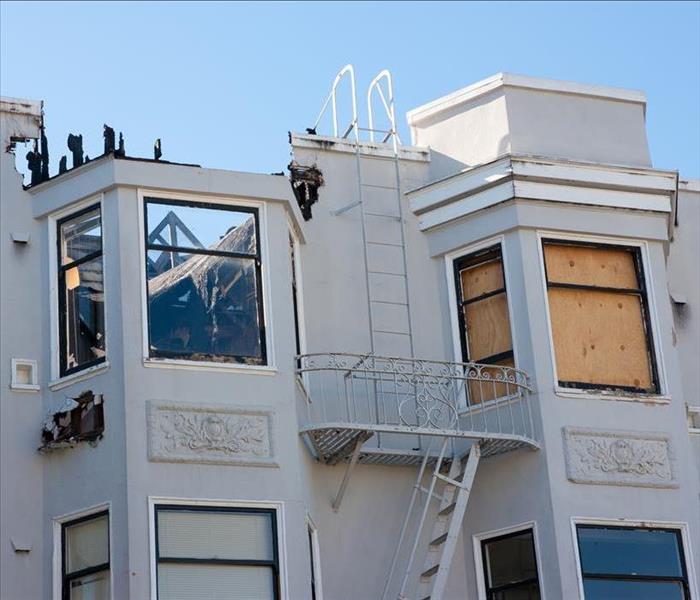 Roof damaged by fire in a building in Buckhead, GA.
Roof damaged by fire in a building in Buckhead, GA.
How to Get the Most Out of Your Recovery After a Partial Loss
A fire can be devastating, both financially and structurally, as it often results in fire, water and smoke damage. Areas of a building not even touched by flames may require cleanup and restoration, and electronics throughout the building may be ruined due to smoke, water and power surges. So, as a business owner, it can be devastating when an insurance company deems one's fire loss a "partial loss". If your insurance company recently returned a partial loss verdict, it's understandable if you're feeling frustrated and unsure of what to do. However, don't let your frustration get the better of you; instead, take the following steps to maximize your recovery and get your business back off the ground:
• Call in a Buckhead, GA, fire restoration team to perform a thorough inspection and document damage.
• Document everything that was damaged or destroyed, even if you're not sure it's worth documenting.
• Check for mold, smoke, soot and other irritants.
Request a Thorough Inspection
Most insurance adjusters won't accept a fire loss claim without the findings of a thorough inspection. This means that you cannot just assess the damage yourself, mark stuff down and send in a claim. You must call in a licensed contractor who can walk through your building and inspect the roof, structure, siding, windows, insulation and plumbing, and HVAC systems. The contractor can provide an official report that itemizes damages and losses.
Document Losses
While a professional fire cleanup team can assess your building for structural damage, they likely won't know how to categorize your more personal losses, such as equipment loss, data loss and damage to confidential documentation. Do this yourself to ensure that you are covered for everything.
Check for Irritants
Most insurance companies are required to cover mold, smoke, or soot restoration, so long as the damage was from the recent disaster. Have your inspector check for any irritants so that you can request remediation.
If all else fails, claim unreimbursed losses on your tax return. However, a thorough inspection, detailed documentation, and present irritants may be all you need to maximize recovery for fire loss.
How To Safely Recover From a Basement Flood
10/13/2021 (Permalink)
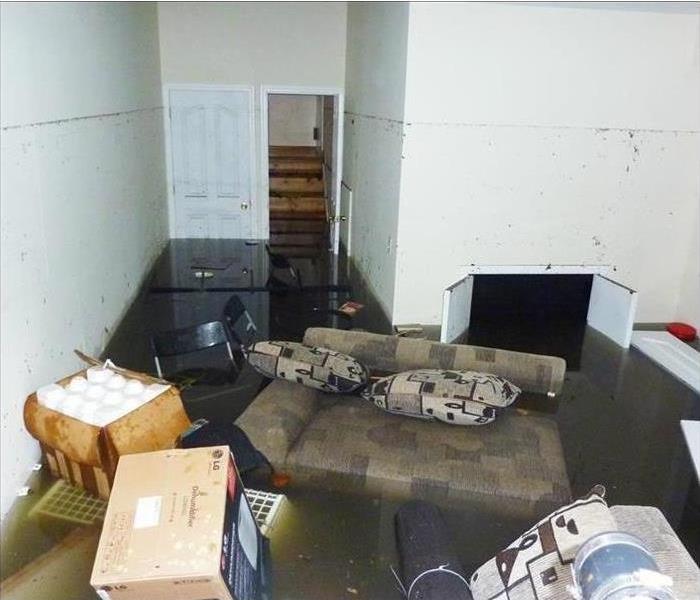 A basement flood can lead to a tremendous amount of property damage.
A basement flood can lead to a tremendous amount of property damage.
How To Safely Recover From a Basement Flood
A basement flood can lead to a tremendous amount of property damage. The quicker you act when a flood occurs, the better off you may be with your recovery. For significant water disasters, call one of several water mitigation companies in Ridgeview Park, GA, for help. If the flood is minor, you can do the cleanup yourself by following three steps.
Remove water
Discard appliances
Implement preventatives
Remove Water
When dealing with a flooded basement, the first step is to remove the water. However, it may not be so simple. First, if a broken water fixture causes the flood, you need to shut off the water supply but consider safety. If flood levels reach a depth of greater than one inch, turn off the electricity to the affected area to minimize the risk of injury. Use shop vacs and pumps to remove the excess water.
Discard Appliances
For deep floods, discard contaminated appliances. All matters of bacteria can call a basement flood home. Removing water from the area will not automatically eliminate all contaminants. Devices may also suffer from electrical issues because of the water damage sustained during a flood. You are better off buying new appliances, and, depending on the circumstances of the flood, your insurance coverage may supply enough funds to replace equipment.
Implement Preventatives
After resolving the original water or plumbing problems, implement preventative measures, ensuring a dry basement. Install sump pumps, backwater valves, and other equipment to prevent groundwater and external floods from penetrating the interior of your home.
A basement flood can lead to significant expenses if not dealt with quickly. For minor floods, a DIY approach may work, but for substantial damage, contact professionals to safely mitigate and restore your property. Deep floods, even higher than a few inches, can lead to life-threatening conditions. Do not risk yourself or your loved ones when there are safer options available.
Your Options When You Don't Have a Flood Policy
9/19/2021 (Permalink)
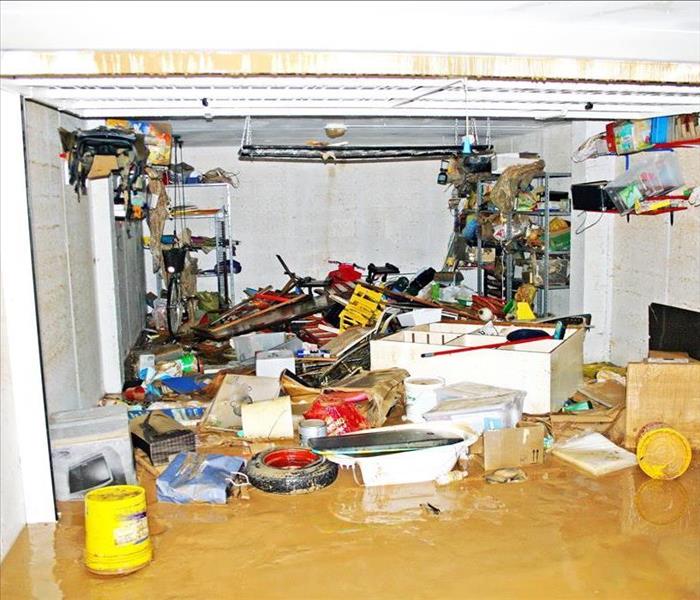 If you do not have flood insurance, you are not without options.
If you do not have flood insurance, you are not without options.
If you don't have flood insurance, and if your home was flooded recently, you are at a loss as to what to do. Flood restoration is costly, not to mention the cost of damage with which you're forced to deal. That said, you may not be entire without options. Depending on where you live, you may be able to get a government grant or, if not, qualify for a loan. Talk to your Atlanta, GA, flood damage restoration team regarding your options. Some viable options may include the following:
• FEMA Grant
• SBA Loan
• Private Loan
Government Grant
The government offers up to $33,000 dollars per household for temporary housing, construction, and repair costs for those who live in flood-plane areas. These grants are designed to supplement what a flood insurance policy provides, though those without insurance still qualify. Most homeowners use these grants to replace uninsured belongings, make essential repairs and rent temporary housing.
SBA Loan
If you do not qualify for a FEMA grant, or if you need more money than what the grant offers, you can always apply for a small business loan. The money is only for uninsured losses and if damage occurred to your primary place of residence. That said, the amount of the loan is pretty significant and can be as much as $200,000 for your primary place of residency.
Private Loan
If you do not qualify for a government grant and if you cannot obtain an SBA loan, your only option may be to turn to a friend or family member for help. If you have close connections, it is not unthinkable that the people in your life would be willing to help you in your time of need.
If you do not have flood insurance, you are not without options. Talk to your Atlanta, GA, flood restoration team regarding additional financing options today.
5 Ways Urban Areas Are Taking on Flooding
9/14/2021 (Permalink)
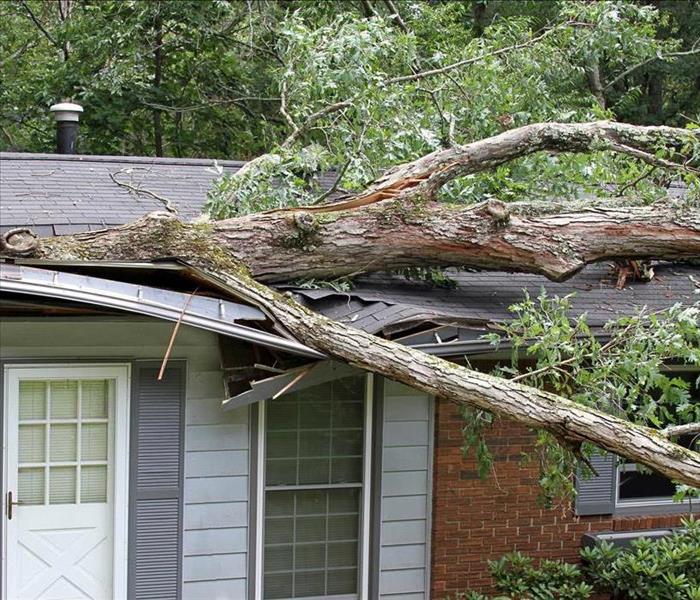 Although a storm can come on fast, advanced warning systems can help people be prepared for the worst.
Although a storm can come on fast, advanced warning systems can help people be prepared for the worst.
Below Are Five Methods Of Gaining Traction Locally And Globally
Storms with torrential rain and steadily rising high water have affected many businesses in Sandy Springs, GA. While personally being prepared and reinforcing structures to minimize damage may help avoid the need for a water damage and restoration expert, other factors play a role, including a city’s flood prevention measures. With more technology available, many urban areas are working to curb flood issues.
1. Sponge Spaces
This ecological approach involves placing features that can naturally hold, clean, and drain water to be used within a city for irrigating farms and gardens, replenishing aquifers, or replacing water used for flushing. Along with reducing flood issues, it can enhance overall water quality.
2. Green Roofs
One way to stop flooding is to prevent rain from cascading off of buildings. Roofs covered, or partially covered, in vegetation, which has an underlying waterproof membrane, absorb the water and reduce runoff.
3. Sustainable Drainage
Cities are covered in concrete, which is not a permeable material. When the rain falls, it flows toward the drainage systems, potentially creating high water. Many cities are replacing materials that block moisture with ones that absorb it. Along with more green spaces, there have been advances in concrete itself to make it more permeable.
4. Warning Mechanisms
Although a storm can come on fast, advanced warning systems can help people be prepared for the worst. While some communities do regular monitoring of rainfall amounts, stream levels, and flow data, many are moving to real-time telemetry systems for enhanced data collection and faster response times.
5. Enhanced Sewer Systems
The first step is keeping existing sewers clean of debris, tree roots, and other buildups. On top of that, many cities are improving water management via upgrading underground piping and drainage systems to separate the rainwater.
Although high water that leads to a flood may not be completely avoidable, communities, residents, and business owners can make a difference in preventing a disaster.
Do Air Purifiers Remove Mold?
9/7/2021 (Permalink)
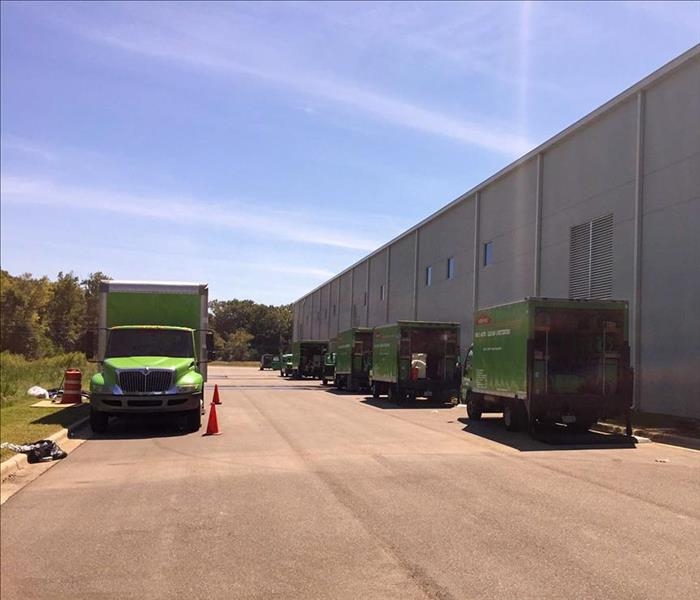 Air filtration can help prevent mold if you use a purifier that uses HEPA filters.
Air filtration can help prevent mold if you use a purifier that uses HEPA filters.
Do Air Purifiers Remove Mold?
Mold infamously reproduces by traveling through the air and finding a damp area to grow and spread. It makes sense that air purifiers can prevent mold from spreading in your home, but do they really work? This informative article can give you a better idea concerning mold removal and whether air filtration can work for you.
What Air Purifiers Do
A purifier removes contaminants from the air, such as dust and pollen. This can be helpful for people with allergies or asthma. Luckily there are specific purifiers that can remove mold from the air. These machines have HEPA filters.
HEPA stands for High-Efficiency Particulate Air and is designed to trap airborne particles that are 0.3 microns or larger. This type of air filtration is recommended by most health agencies such as the EPA and the American Lung Association.
Why They Are Useful
Most mold spores span 1-30 microns, which means that the HEPA filter can remove the spores from the air. By using a purifier, you can prevent spores from spreading or contaminating other parts of your home in Atlanta, GA. It can also protect you and your family members from inhaling any spores.
When Professional Help May Be Needed
You can prevent mold from spreading, but what happens when mold has already spread throughout your home? This might require the help of mold removal specialists. Here are some reasons you should consider doing more than just purchasing an air purifier:
• The mold may already be spreading
• Spores may be embedded in furniture and other porous objects
• Leaks or condensation may be a big issue in your home
If these problems are familiar to your house, then you should seek expert advice and help. Complete removal of all mold is important.
Air filtration can help prevent mold if you use a purifier that uses HEPA filters. Doing this can stop the spreading of airborne mold spores, but you might need professional help to remove past or current mold growth.
There’s Still No Place like Home: Managing Your Expectations and the Cleanup after a Storm
9/2/2021 (Permalink)
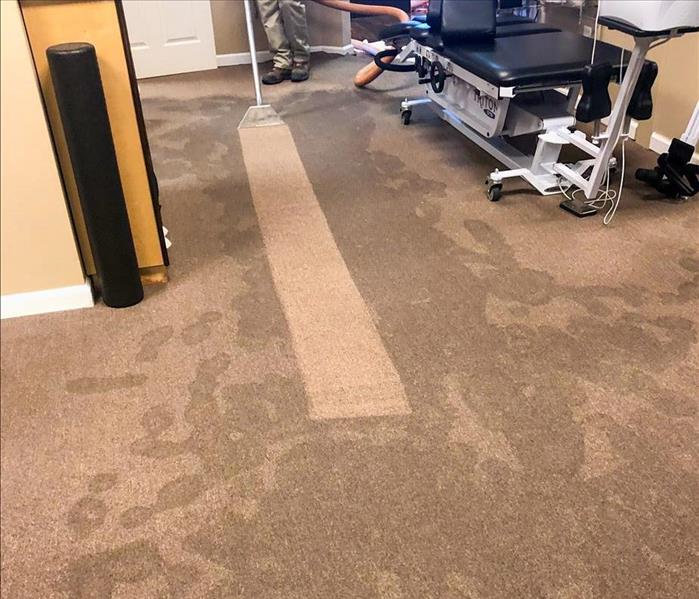 Storm damage, with its grueling process of water removal and tear out, can be overwhelming.
Storm damage, with its grueling process of water removal and tear out, can be overwhelming.
It can be challenging to look at your home after a severe storm, seeing the extent of the damage, but when a storm causes extensive water damage, the path to restoration can seem insurmountable. Thankfully, the storm restoration process can be summarized in a few simple steps.
1. Extract Excess Water
The first step in the process is to extract as much excess water as possible, using several wet/dry vacuums. It’s essential to remove the water thoroughly and quickly to avoid the buildup of mold because, believe it or not, mold begins to develop within 24 hours.
2. Remove/Tear Out Wet Materials
Once you have extracted the excess water, it is time to begin the tear-out process. During this time your focus has to be on removing anything that’s wet, which goes beyond just removing rugs and furniture. You should also remove carpeting and the pad underneath, drywall and the insulation behind, and anything else where mold can develop.
3. Dry the Structure
Once you have removed any wet materials and opened the walls, it is time to dry your house. You are going to need to do more than just open doors and windows, while this helps it does not do enough to circulate the air. During this phase of the cleanup process, you’ll want to rent several industrial fans and air movers to help distribute the air and dry your home.
4. Seek Assistance
While trying to salvage your home can be a massive undertaking after a storm, you do not have to do it alone. You can look up storm restoration specialists in North Atlanta for assistance. Many insurance companies even require it. These professionals will not only have the tools necessary for drying out your home, but they clarify the restoration process and relieve some of your worries.
Storm damage, with its grueling process of water removal and tear out, can be overwhelming, but the few steps above should help alleviate some of that stress, and, while the cleanup process takes time, just know that there’s still no place like home.
The Basics of Mold Remediation
7/26/2021 (Permalink)
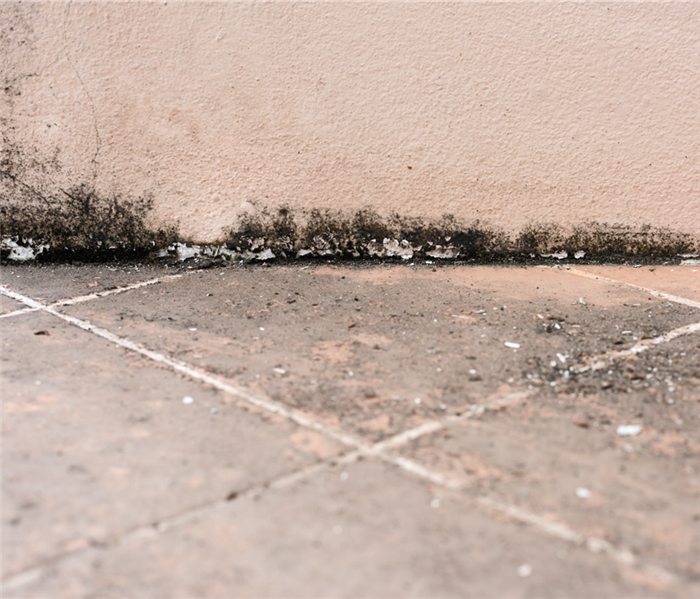 Black mold damage in Virginia Highlands, GA.
Black mold damage in Virginia Highlands, GA.
If you have noticed black mold in your business in Virginia Highlands, GA, you need to act quickly and begin mold remediation as soon as possible. If left untreated, mold can spread quickly through a building. You may want to hire experienced professionals to do the job to ensure that all of the mold is removed properly. It is important to make sure that every step of the remediation process is followed to prevent the mold from reappearing.
The Mold Remediation Process
The experts should follow these basic steps:
• Inspect the property to determine where the black mold is and how severe the damage is
• Contain the mold to prevent it from spreading anywhere else
• Filter the air with specialized equipment to capture tiny mold spores in the air
• Use antifungal and antimicrobial treatments to remove mold and prevent regrowth
• Dispose of mold-infested materials
• Clean and sanitize items such as furniture, carpet, and decorative items
• Restore any building materials that were damaged or removed during the mold removal process
Preventing Black Mold in the Future
Once the mold clean-up is complete and your building is back in shape, there may still be work to do. Unless you eliminate the problem that caused the mold in the first place, you run the risk of mold growing right back where it was. If your mold professionals identified the cause of the mold, you’ll want to deal with it as quickly as possible. Potential causes of mold include leaky roofs, windows, and pipes, flooding, and high humidity levels. Speak to your mold professionals to determine the best plan of action for you and your business.
Mold cleanup can be a time-consuming and expensive process. The key to minimizing damage is fast action. Take the time to make sure mold is removed correctly and you will save time in the future instead of dealing with it on a regular basis.
4 Safe Candle Alternatives for Your Home
7/23/2021 (Permalink)
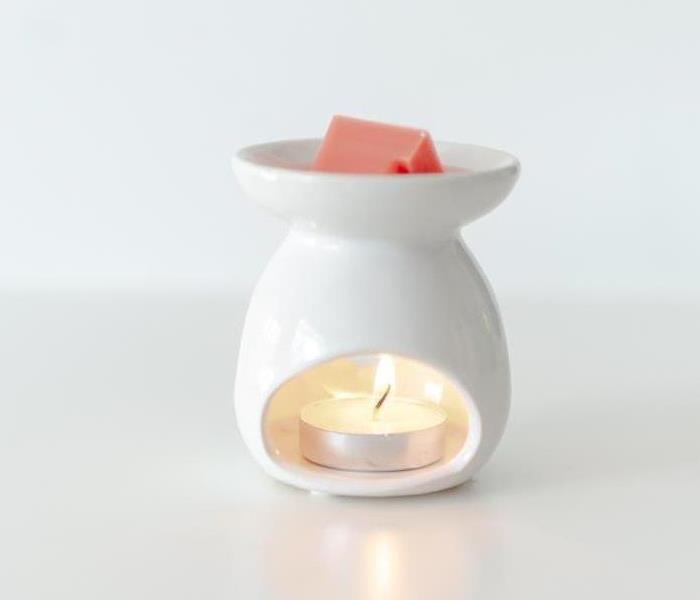 Candle alternatives are helpful for saving your residence from the risk of fire.
Candle alternatives are helpful for saving your residence from the risk of fire.
4 Candle Alternatives That Are Safe To Use In Your Home
When darkness falls, or the air needs freshening, people often turn to candles. Despite the appeal of their various scents and simplicity, candles pose a fire risk to your home in Lenox Square,GA. Instead of accepting the risk, you can consider any of these four candle alternatives.
1. LED String Lights
LED lights are not just for the holiday season. With their use inside your home, you can provide the same light a candle does. This can be done by stringing them across a table or filling a glass with a line of them to create a makeshift lamp. LED lights are a flameless alternative to creatively brighten your house in whatever color you wish.
2. Electric Candles
As a direct replacement for candles, tea lights use batteries instead of fire. They have the appearance of candles if you desire to preserve their aesthetic. The major advantage of electric candles compared to typical candles is the ability to leave them lit even when you can’t monitor them. With this substitution, there is no need to fear a candle fire while asleep or in another room.
3. Reed Diffusers
If the pleasant scent of a candle is what you are looking for in your candle alternatives, reed diffusers are a natural option. Using only reeds and scented oils, the aroma seeps into the air and fills a room. The scented oil comes in many varieties so you can find one to your liking without the worry of any dangerous heat.
4. Wax Warmers
While similar to a candle, wax warmers are flameless and safer. By using electricity or batteries, the dish containing wax heats up and carries the scent around like a candle but without the flame.
Candle alternatives are helpful for saving your residence from the risk of fire. Even if your best efforts of fire prevention fail, fire damage restoration is available for the aftermath of when a candle or other flame goes awry. Using flameless sources of scent and light will make your home less fire prone.
Step by Step Guide to Managing a Toilet Overflow
6/25/2021 (Permalink)
 Fix your toilet.
Fix your toilet.
Managing A Toilet Overflow
As a homeowner, there are a few plumbing issues you can expect to crop up. Clogged pipes, leaky faucets and overflowing toilets are all common enough problems that you shouldn't be too surprised if they happen to you. The toilet overflow presents a unique challenge for Vinings, GA, homeowners because it introduces the possibility of sewer damage. If your toilet starts running over, consider following these basic steps.
1. Stop the water. Your first mission should be to end the deluge of water. Most toilets have a shut-off valve at the base. Check to see if your fixture has one. If not, you can stop the water by manually manipulating the float. If all else fails, you can turn off your home's water until the flooded toilet has been taken care of.
2. Get some help. Once the initial onslaught of water has been stopped, you need to call in a water restoration expert to help you assess the damage. This professional can help you figure out why the toilet started to overflow. The team may also create a sewer damage cleanup plan to help you get your bathroom back to normal.
3. Remove the water. Leaving standing water in any part of your home is unwise. The water damage team will likely remove the water as soon as they can. This helps reduce the secondary damage, such as mold growth and material contamination, that can happen as a result of a flooded toilet.
4. Fix the toilet. Chances are your toilet overflowed for a reason. The most common reason is a clog. Work closely with a plumber to remove the blockage from the pipes. If this does not seem to be the issue, you can call the sewage company to figure out what's going on with your system.
The sooner you can address sewer damage the better it is for your home. This type of dirty water can lead to mold growth in as little as 24 to 48 hours.
Avoiding Puff Backs in Your Home
6/25/2021 (Permalink)
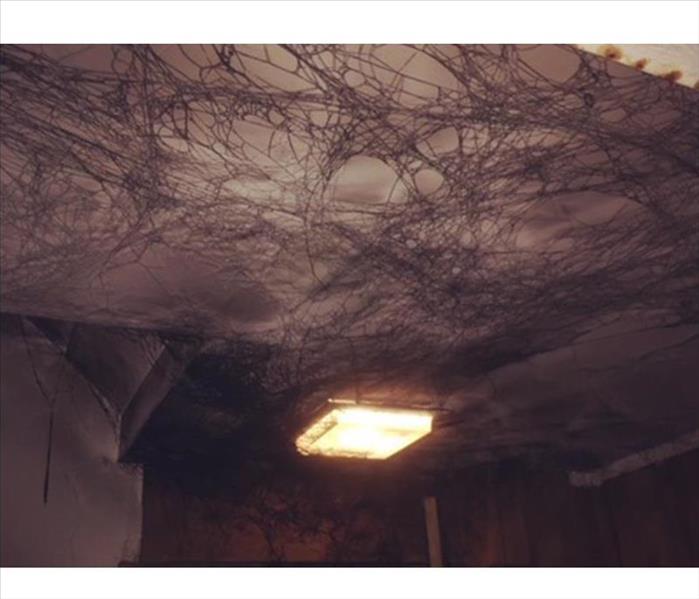 Puffback damage in Sandy Springs, GA
Puffback damage in Sandy Springs, GA
How To Prevent A Puffback In Your Home
Your furnace works hard day in and day out to keep your Sandy Springs, GA, home a warm, comfortable place to live for you and your family. However, when left to its own devices too long without the proper maintenance measures, this same furnace can produce a puff back, a small inner-furnace explosion with the power to spread soot and smoke all across your home in a matter of seconds. The best way to defend against this issue is to
- Schedule regular inspections
- Regularly change your filters
- Check your fan now and again
By taking these steps and learning the basics about puff backs, you can ensure you never face this issue in your home.
Invest in Inspections
The average puff back can be caused by a wide range of reasons, almost every single one of which boils down to improper maintenance over extended periods of time. That’s where having a professional on your side comes in handy. Having an annual inspection done by a certified pro helps you catch issues early on and keeps your furnace running smoothly so furnace explosions are never a concern.
Change Filters
A leading cause of puff backs is a clogged filter. When filters become clogged, dirt and dust get sucked into a furnace. Especially in oil-burning furnaces, these particles can combust, leading to an explosion that sends soot flying through the vents. Filters are generally affordable and easy to replace, fortunately, making this a precautionary step any homeowner in Sandy Springs, GA, can take.
Check Fans
Another cause of puff backs is a fan that’s not operational. When the fan can’t move, heat gets backed up in your vents and furnace, which contributes to the formation of puff backs. Checking both your fans and vents now and again helps ensure the heat is moving as it should be.
Each of these steps is fairly simple but can be crucial. You want to do what you can to prevent a puff back of any magnitude from occurring in your home.
Hail Can Make Commercial Property Frail
6/25/2021 (Permalink)
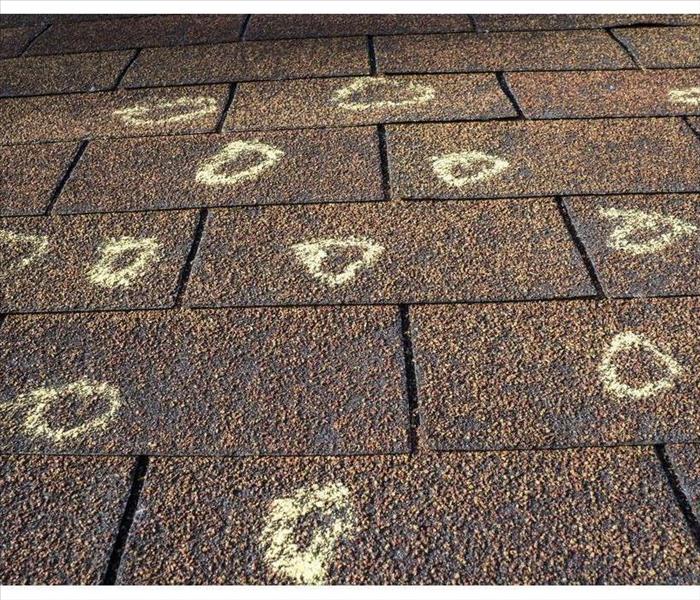 Hail damage to roof.
Hail damage to roof.
Hail has varying effects on property depending on conditions at the time. Even if the hailstorm isn’t severe, long-term exposure to multiple impacts will damage the exterior of commercial property and require repairs for roof damage and other structural harm.
Understand Hail’s Variance
Just like any other natural event, there are a few different contributing factors to the damage each unique hailstorm can cause:
- Wind direction and speed can direct hail to hit vulnerable spots at high speeds
- Hailstones vary from pea-sized to the size of a baseball with different forces of impact
- Different materials absorb the impact differently, such as aluminum denting easily
- Coverage from nearby buildings or trees can absorb impact from certain directions
Know What Hail Damage Looks Like
Depending on the type of shingles and the storm, hail damage will look different when you inspect it. If your business has asphalt shingles, the roof should be evaluated for black-colored spots or missing shingle granules. Any fresh roof damage will be apparent following a storm since the substrate layer has no exposure to the sun and will shine brightly.
Wood shingles show damage differently. The shingles will appear split or sharp on the edge. They may also be a dark orange color or have visible impact marks. The cracking in wood makes it more visibly harmed than asphalt.
Prepare for Repairs and Water Damage Cleanup
Regardless of the type, water damage coming from the roof is the most revealing sign of roof problems. This can be ruined insulation in the attic or water seeping into the property. Repairing the roof as soon as possible to prevent further water damage is highly advised to prevent water damage.
Water damage becomes worse as it sits and deteriorates either, so reaching out to a professional storm cleanup crew can salvage damaged capital. Hail in Ridgeview Park, GA, is a threat regardless of how severe a storm. Keeping up proper maintenance and upkeep by understanding hail helps stop roof damage from becoming much worse.
5 Steps To Develop a Business Continuity Plan
6/14/2021 (Permalink)
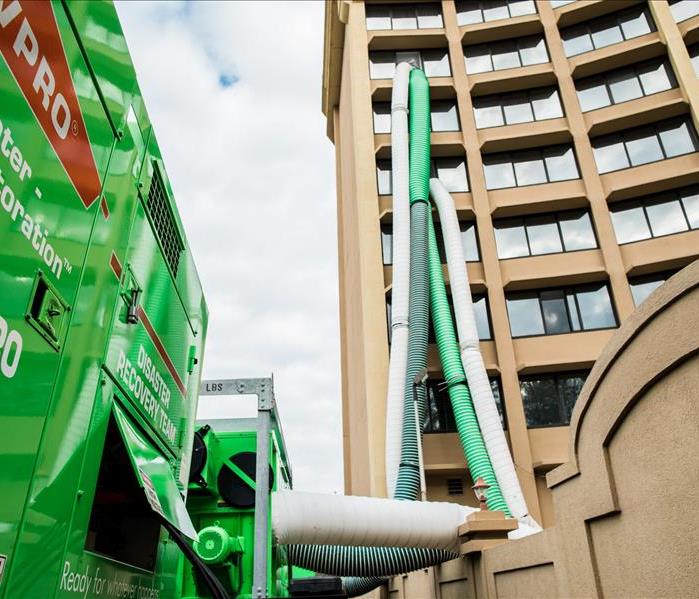 We can handle any sized commercial storm damage loss.
We can handle any sized commercial storm damage loss.
5 Steps To Develop a Business Continuity Plan
When disaster strikes your business, the difference between survival and bankruptcy is usually about preparation. This includes developing a continuity plan and having all the components set up in advance, because when you’re in the middle of a catastrophe, all you can do is react, not plan.
Fortunately, all this has been well-researched and practiced. If you take these five steps before a storm hits, you’ll almost certainly survive where others succumb to the devastation.
Create a Business Impact Analysis
Have a meeting to discuss the most likely disasters in Atlanta, GA. Your goal is to create a risk assessment so you can properly allocate resources. This impacts every other step.
Develop Recovery Strategies
Identify the most time-critical processes that are likely to be impacted after receiving serious storm damage. What resources are needed? How long can you survive without revenue generation – and how is it likely to be impacted by the storm? How will employees be impacted? What about utilities?
You may also consider business interruption insurance. It’s not cheap, but it has saved countless enterprises over the years.
Plan Development
Now that you have a good idea of the risks and how to recover, create documentation to support your strategies. Get all key employees involved and listen to suggestions from experienced workers. Consider what flooding would do to your building and have a water-resistant place to put documentation.
Create A Ready Profile
Your local restoration experts have a readiness program that includes a free smartphone app and a no-cost assessment of your facility’s needs. They’ll help you develop an Emergency READY Profile that contains all the emergency info you need when things fall apart.
Test Your Plans
Run an exercise to locate flaws and identify where assets might be more helpful. Resource management during and after a disaster is complicated and confusing, so testing is essential to a smooth recovery.
When your continuity plan is set up and tested, your business will be far more likely to recover from a disaster. Don’t be afraid to delegate the task to your most trusted employees – just be sure someone does it.
3 Ways To Get Rid of Mildew on Plants
6/14/2021 (Permalink)
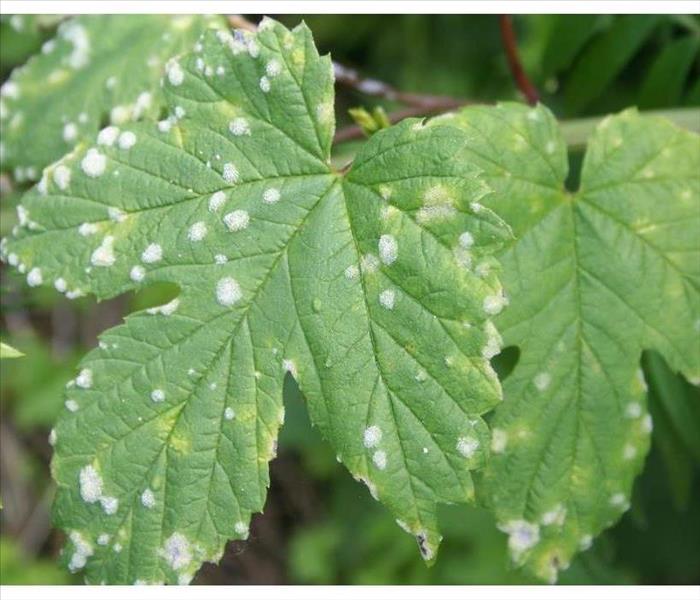 Plant mildew can be a frustrating problem to get rid of.
Plant mildew can be a frustrating problem to get rid of.
3 Ways To Get Rid of Mildew on Plants
Mold and mildew tend to thrive in dark and damp conditions. Because the soil in many potted plants is conducive to mold and mildew growth, plant mildew is often an issue for people. These are three ways you can get rid of it.
1. Prevent It From Growing
One of the best ways to eliminate mildew in houseplants is to prevent mildew growth from starting. Whenever you pot a new plant or change the soil in an existing one, use healthy, sterile soil. Don't overwater your plants. Clean debris, such as dead leaves, out of pots and dust the leaves of plants regularly. Make sure your plants have adequate light and ventilation.
Moisture on the leaves of plants can contribute to mildew growth. Water your plants from the bottom, instead of misting the leaves.
2. Remove the Mildew
Plant mildew can be contagious, so it is best to isolate a planet with mildew from your other plants. Pinch off and discard affected leaves. If mildew is widespread, mix one tablespoon of baking soda with a half teaspoon of liquid soap and one gallon of water. Spray this mixture on the affected leaves.
If this method is ineffective, you can try a household fungicide. It is best to take houseplants outside to apply these products.
3. Control Moisture in Your Home
High moisture conditions in the home can promote the growth of mold and mildew. Check your home for sources of moisture, such as leaking pipes. If you are noticing brown or green stains or musty odors in your home, you may have mold growth. Contact a mold remediation company in Atlanta, GA to inspect your home and remove mold.
Plant mildew can be a frustrating problem to get rid of. However, following these steps can help you eliminate problems with mold and mildew in your home and prevent them from occurring in the future.
3 Challenges Posed By Commercial Smoke Damage
4/19/2021 (Permalink)
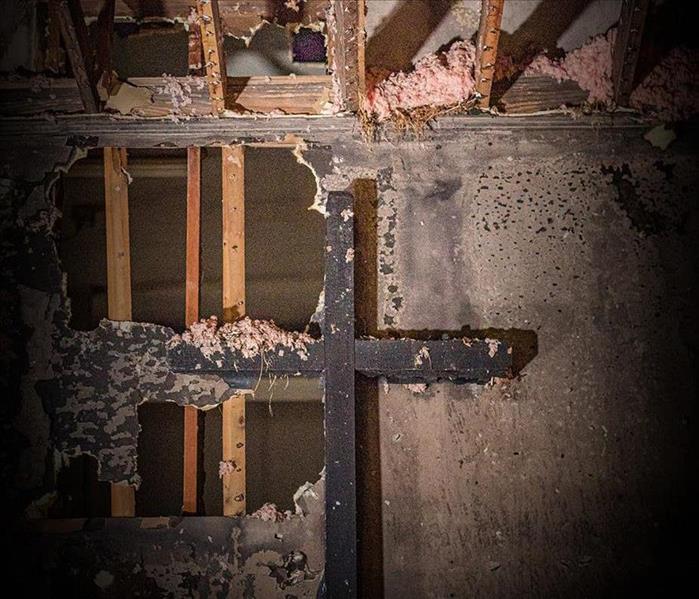 Fire event damaged structure to a building in Atlanta, GA.
Fire event damaged structure to a building in Atlanta, GA.
Commercial Smoke Damage
Smoke damage can be one of the most lasting consequences of a fire that has occurred in or near a commercial building in Atlanta, GA. Specialized smoke cleanup solutions and equipment are essential for getting rid of this odor, as is awareness of the many ways in which smoke odor molecules can stick around for weeks or months after a fire.
1. A Coating of Smoke Residue on Surfaces
Smoke residue can build up on fixtures, furniture, walls and floors in a commercial location. This sticky coating may be present throughout a structure that has experienced a fire, even in areas that were not directly exposed to open flames. While vacuuming may be able to eliminate soot damage, this resinous coating calls for the use of specialized solvents.
2. Smoke Odor Lingering In an HVAC System
Aside from the air and visible surfaces inside a building, smoke damage can also spread through the HVAC system. Whether or not this system is in use when a fire breaks out, particles of smoke and soot can find their way into vents and ductwork and spread as soon as the system is turned on unless ductwork has been cleaned.
3. Untreated Contents Posing Recontamination Risks
Any smoke-damaged contents that stay in a structure may prove a source of the persistent smoke odor. For this reason, contents are typically removed from the location of a fire, cleaned off-site using treatments that neutralize smoke odors and stored until the fire restoration is finished.
Smoke cleanup should take place after fire cleanup for a fire that has happened on-site at a commercial structure in Atlanta, GA. It is necessary to eliminate charred materials and soot from a building before treating smoke damage on surfaces or in the air. If smoke odor continues to pose a problem after fire restoration, most commercial property insurance policies also cover smoke cleaning.
5 Steps for Cleaning and Maintaining Your Gas Range
3/30/2021 (Permalink)
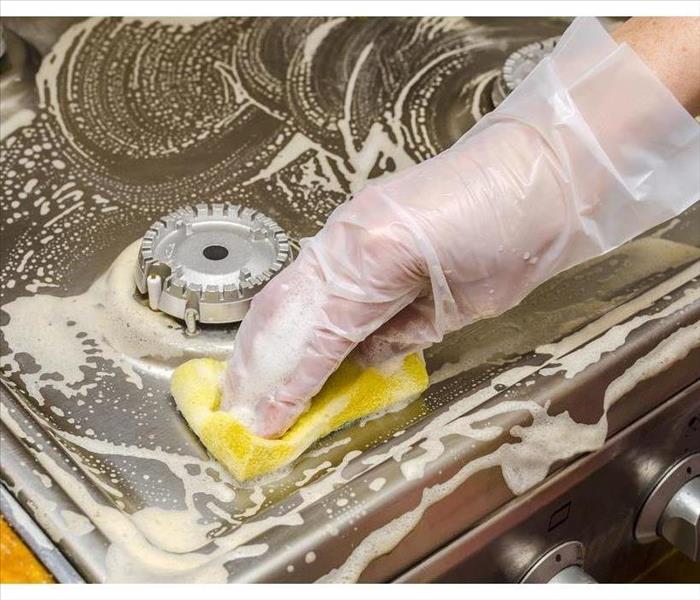 Keep your gas range clean and you will avoid grease fires.
Keep your gas range clean and you will avoid grease fires.
Keeping Your Kitchen Clean Can Prevent Grease Fires
While more and more homes have electric stoves and ovens, a gas range is still a popular choice for many people, especially those who are serious about home cooking in Atlanta, GA. One downside to a gas stove over a flat-top electric stove is that the cleaning process is more involved. However, not only does regular cleaning keep your kitchen looking spic and span, but it can also prevent smoke and grease fires.
1. Remove Grates
On a gas range, you can remove the grates around the burners. Soak them in a sink of warm, soapy water while you work on the rest of the stove. Later, scrub them clean.
2. Clean Crumbs
Loose crumbs on your stove are what cause a smoke smell while you're cooking. Charred bits of pasta, crusted on sauce, and other mysterious tidbits that always end up right under the flames not only smell bad, but can lead to a fire.
3. Spray Cleaner
Choose your favorite cleaning products but keep in mind that some more abrasive chemicals might strip the temperature markings from your stove's dials. A mixture of vinegar and water works well to cut grease from your stovetop. Spray it on, let it sit for a bit, and then wipe clean.
4. Scrub Stains
For stubborn stains usually caused by grease, dish soap and a toothbrush can work wonders. This is the part where regular maintenance makes this chore much easier. By taking care of a couple of grease spots now, you save yourself hours of work later if you let the stains build up.
5. Degrease Burners
Even the burners need some love. The burner tops can soak with the grates while the toothbrush can help get grease out of the burner heads. Where there is grease buildup, there's a fire risk. While a fire restoration company can help you put your kitchen back together after a fire, proper range cleaning will prevent many problems.
A gas range is a great tool for your home cooking endeavors. Proper maintenance will keep your kitchen looking tidy as well as a safe place to turn out gourmet meals.
Routine Maintenance Can Protect Your Business From Storm Damage
3/30/2021 (Permalink)
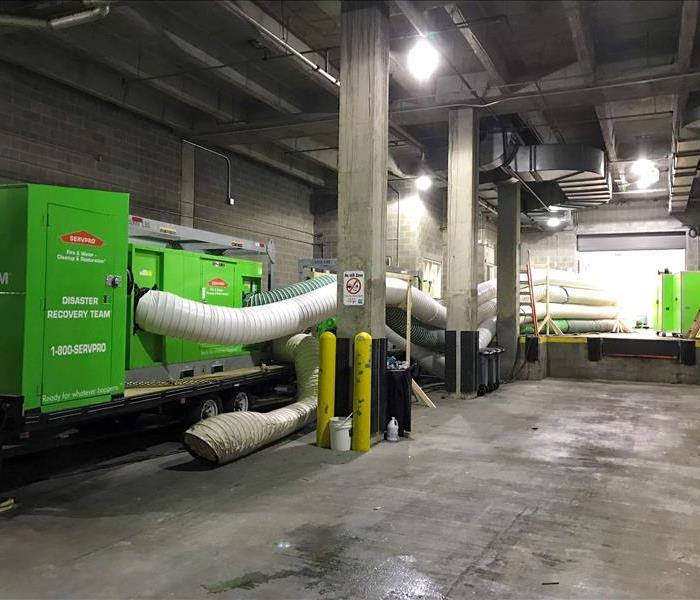 Have your building inspected once a year.
Have your building inspected once a year.
Protect Your Business From Storm Damage
Routine exterior maintenance of your Atlanta, GA commercial building can help the structure better withstand inclement weather. Whether you are anticipating strong thunderstorms or heavy snows, a strong exterior will keep your business protected.
Inspection: A thorough building inspection will alert you to any weaknesses or problems that make your building more vulnerable to storm damage. A full exterior inspection will cover all of the following areas:
- Roof
- Foundation
- Windows
- Doors
- Brick, stucco, siding, etc.
- Gutters and downspouts
The frequency of inspections depends on a variety of factors, including the age of the building and local weather patterns. At minimum, have the building professionally inspected once a year, ideally before the stormiest season. Make sure the building is checked for cracks in the walls and foundation, loose gutters and weak spots in the roof. A trusted building inspector can let you know what areas of your structure may need more frequent inspections.
Even a building that passes an inspection can still be vulnerable to storm damage. If this happens, an experienced restoration service can get your property back to normal so that it can successfully weather the next storm.
Maintenance: In addition to routine inspections, it is important to keep your building maintained. Exterior maintenance involves more than simply repairing the issues discovered during inspections. Keep gutters and downspouts clear and make sure they are not loose. Remove debris from the roof. Pressure wash as needed to minimize fungal growth. Make sure all signage is securely attached to the building.
The nearby landscaping also affects the structural integrity of the building and should be properly maintained. Keep limbs trimmed and make sure trees are healthy and strong to prevent them from damaging the building. Consider grading the lawn away from the building and installing plants and mulch to prevent flooding.
Stormy weather can cause serious problems for your commercial building. However, a little routine exterior maintenance can prevent many situations.
What Can Cause Secondary Damage After a Flood?
3/9/2021 (Permalink)
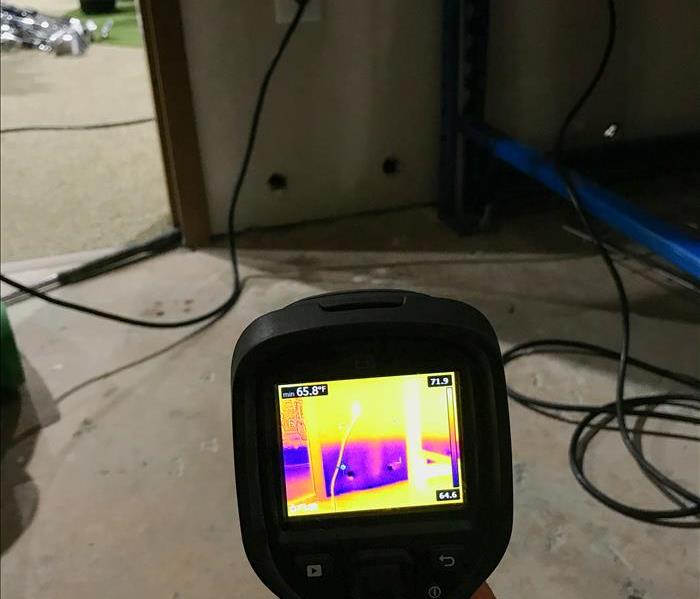 Water damages can lead to mold problems
Water damages can lead to mold problems
A flood, fire or any disaster that involves the quick spread of large amounts of water can quickly lead to further damage from black mold formation at your home in Atlanta, GA.
What Is Secondary Damage?
This type of damage begins to take hold soon after the threat of the original disaster is under control. It is often due to:
- Improper sanitization measures
- Delay in drying efforts
- Insufficient repairs
- Poor ventilation
Mold is among the most prevalent causes of damage in the aftermath of a flood. It can quickly form and spread in various circumstances, such as after using a fire hose to extinguish flames, when plumbing pipes freeze and break or when water enters a home through cracks or a faulty foundation during a severe storm.
What Is the Best Way To Prevent Black Mold After a Flood?
The most reliable way to avoid mold following a flood is to dry out your space immediately. When dealing with large volumes of water, it is best to contact a professional disaster restoration service to apply urgent and rigorous mold prevention measures. Flood recovery teams can use industrial-strength water extraction machines to reduce high humidity quickly and efficiently remove excess water before it leads to mold.
What Are Some Ways To Manage Mold After It Starts To Form?
If mold has already taken hold, professional restoration services can undertake mold remediation to prevent it from spreading. For example, air filtration and ozone treatments can remove hazardous mold spores and their musty odors from the air. When water saturates walls or ceilings, removing and replacing mold-infested drywall can prevent more severe structural problems. Immediate action can mitigate damage after a flood and may raise the chances for a successful insurance claim to defray post-flood expenses.
Secondary damage from black mold formation is avoidable if you take immediate steps to control high humidity and dry your space after a flood. When in doubt, contact a professional flood restoration service for sound advice.
Find Commercial Disaster Recovery Help Fast
2/19/2021 (Permalink)
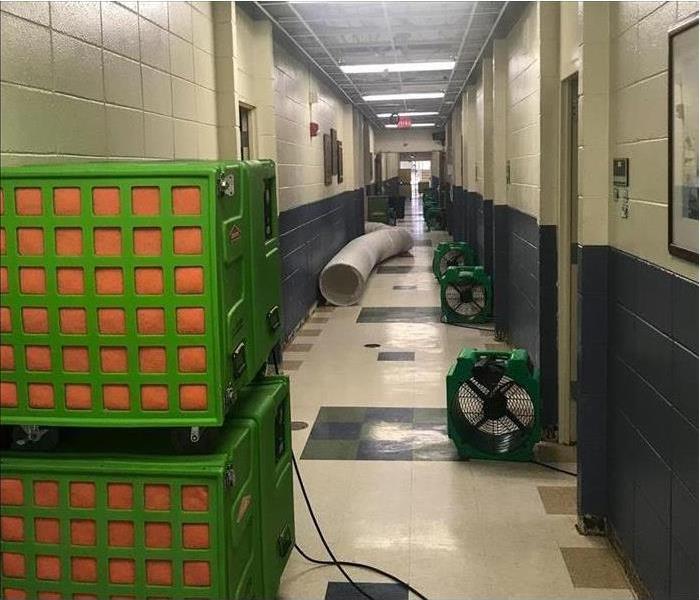 We can remove the water from your business.
We can remove the water from your business.
If your commercial building in Atlanta, GA has suffered extensive damage, the devastation can leave you feeling overwhelmed. It is hard to know where to turn and what to do first. Finding disaster recovery help quickly is critical to reduce the damage and loss to your facility.
How SERVPRO Helps You Recover Fast
A SERVPRO franchise employs experts who are trained to handle large and small disasters. In fact, this service is recommended by most insurance companies for many reasons:
Local Franchises – Because each franchise is locally owned and operated, you get the best of both worlds. A local business means you are never too far away from help. Plus, because SERVPRO has corporate headquarters, each franchise has access to resources and equipment when needed.
Availability – Each franchise has professionals standing by 24 hours a day to help. Because time is of the essence during the disaster recovery phase, this immediate service is essential.
Trained Professionals – SERVPRO professionals are trained and certified in a variety of programs to give you the best possible help to recover from any disaster.
What SERVPRO Professionals Do
After you make that initial call, a professional will be out quickly to examine the situation. When answering a storm response call, an expert trained in commercial restoration inspects the building and the surrounding property to assess the damage. A comprehensive plan is then developed to handle the storm damage and get your business back up and running as soon as possible.
SERVPRO has technical equipment, such as industrial vacuums and submersible pumps, to remove the water. Dehumidifiers and air movers dry the affected areas, and specialized microbial treatments and air scrubbers remove bacteria and mold from surfaces and the air. Once the surfaces and structures are cleaned or removed, renovation takes place.
When you suffer a devastating loss to your building, put disaster recovery in the hands of experts.
What To Do When Floodwater Gets in the Furnace
2/11/2021 (Permalink)
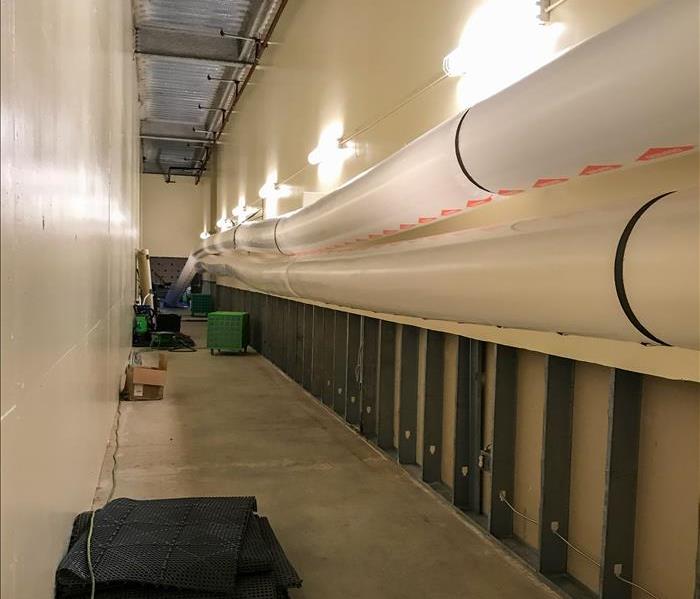 Dealing with flood water.
Dealing with flood water.
When floodwater gets into the furnace of your Atlanta, GA property, everything the water touched must be cleaned and restored, so you can avoid further damage. One area of damage that can be easily overlooked is a furnace flood. When the flooded furnace and any affected HVAC ducts aren't professionally restored, the secondary damage could be even more of a problem than the original flooding.
Act Quickly To Avoid Further Damage
There are several steps you should take as soon as you notice water, whether it's a furnace flood or a burst pipe:
Shut off the water to your building from the main stopcock. This prevents more water from spreading throughout your building. It also reduces the risk of water and electricity combining.
Turn off the electricity. Even if a small amount of water can cause serious electrical trouble.
Move items away from the water. You may have large pieces of furniture that you can safely move to a dry location. Don't move electrical appliances; leave these items to the professionals.
Remove as much water as possible. The longer the water sits, the more damage you could experience.
When water damage and cleanup professionals arrive, they will use powerful water extraction tools and chemical cleaners that have been developed specifically to protect your flooded furnace and other appliances from further harm.
Contact Professionals for Necessary Repairs
These professionals can also complete air duct cleaning, address soggy carpets, and repair other parts of your property. If the services of a plumber are required, the cleanup technicians or your insurance provider may suggest a reputable professional in your area.
A furnace flood can cause a lot of upset and inconvenience, but with quick action and the help of professionals, you won't have to wait long for a solution. As you have the furnace and ductwork cleaned and maintained, you'll breathe much more easily in the days to follow.
Mold Removal Expectations
2/2/2021 (Permalink)
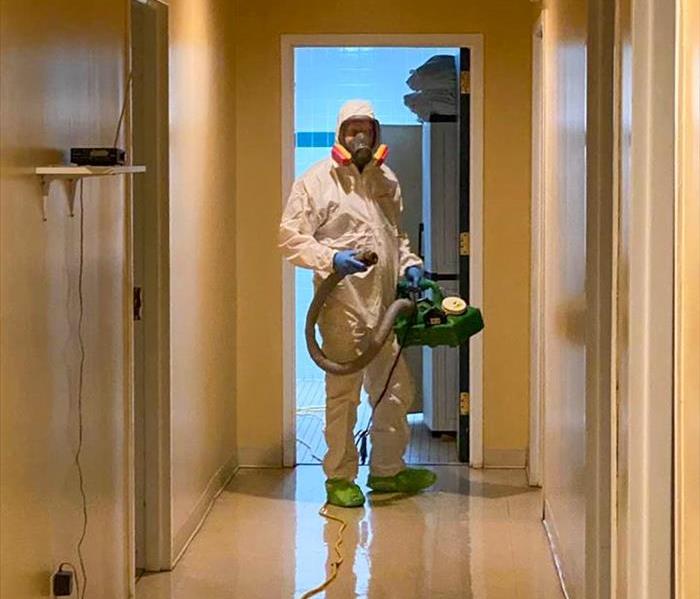 Mold remediation in Atlanta, GA.
Mold remediation in Atlanta, GA.
Finding mold in your Atlanta, GA business is frustrating. As a savvy business owner, you know how vital it is to get the problem taken care of as soon as possible. On the flip side, time is money for continued business success. Understanding the mold removal process and getting the right help are keys to a faster recovery.
The Remediation Process
When it comes to mold growth, every situation is different. In most cases, the remediation process takes three to seven days. Depending on the location and extent of damage, it may require moving operations off-site during the cleanup. Once an inspection and assessment are completed, you can have the following expectations for mold removal:
- Technicians will be outfitted with safety gear, including a face mask, goggles, gloves and protective suit.
- The affected area will be sealed off with a containment barrier, ensuring spores don’t spread to unaffected areas.
- Unsalvageable materials will be removed, such as portions of drywall, insulation and baseboards.
- Surface areas are treated to kill the mold.
- After physical removal, high-tech air scrubbers or other tools are used to clean the air of any potential spores.
- A sealer or encapsulant may be used to increase resistance to black mold and water damage, as well as control odors.
Expertise Matters
Knowing that mold may easily return if not properly taken care of, finding the right help is essential. If the damage is extensive, it's best to find a certified remediation and restoration company. That ensures they are up to date on the latest standards and processes. It is also important to verify that their technicians are also certified. Along with having the tools and techniques needed for cleanup, they will also be able to make any structural repairs.
While mold removal may mean some downtime, not getting it properly taken care of may mean much more downtime in the future.
4 Candle Alternatives for Fire Safety
2/2/2021 (Permalink)
 Strings of lights are designed with fire safety in mind
Strings of lights are designed with fire safety in mind
Here are Four Fire-Safe Candle Alternatives
Candles are used to create decorative lighting effects or release fragrances. Whether you are looking for safer mood lighting or a way to diffuse a scent without any risk of a candle fire, here are four fire-safe candle alternatives.
1. Battery-Powered Candles
A flameless electric alternative to candles can be placed anywhere for decorative or lighting purposes. Electric candles come in a wide variety of colors, heights, thicknesses and designs. Some battery-powered models are also designed to release fragrances.
2. Strings of Lights
Another way to get a candle-lit look is to string up Christmas or fairy lights. Strings of lights are designed with fire safety in mind. Choose from strands of single-color or multicolor bulbs. It is also possible to set up lights to blink or flicker if desired. Ultra-efficient LED bulbs make replacements affordable and keep energy costs low.
3. Candle Warmers
A candle warmer may be the best option among these candle alternatives for fans of scented candles. A warmer makes it possible to enjoy these fragrances with a much lower fire risk. A warmer may be a base on which a candle sits or resemble a lamp.
4. Diffusers
Reed diffusers do not resemble candles. For a different look, reeds in oil can be an attractive, creative and flameless way to release a scent. Diffusers have an even lower risk of fire than an electric candle warmer.
Most candle fires occur around the holidays. Battery-powered candle alternatives and strings of lights are safer options for illuminated decorations. Warmers and diffusers are useful for spreading a fragrance throughout a home with a lower risk of fire. If a fire starts due to a candle or any other cause, you should attempt to extinguish the flames or contact the fire department. Fire damage restoration experts can restore or replace damaged building materials at a residence in Atlanta,GA.
4 Tips for Getting Water Out of Your Crawl Space
1/15/2021 (Permalink)
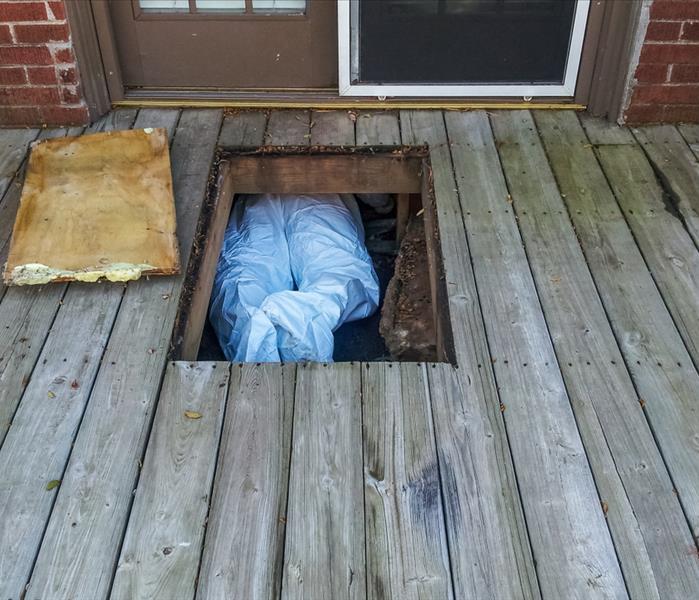 Removing water from your crawl space is a serious process that can require some equipment
Removing water from your crawl space is a serious process that can require some equipment
Following These Tips Will Get You Started On The Right Path
When there is water under your home, you must get it out. While it may not be easy, removing the water will prevent mold from causing structural damage. However, a lot of people don't know the best ways to remove excess water. Most people think you need serious equipment, such as a sump pump and a trash pump.
1. Identify the Problem
You should identify the problem that is letting the water into your home in Ridgeview Park,GA. Common issues include foundation cracks and leaky pipes. You may also find water seeping through the floor around your toilets. Before removing the water, you need to fix the problem.
2. Buy a Submersible Pump
A submersible pump is a valuable piece of equipment that removes standing water. They are available at any home improvement store. Dig a hole and install the pump into that. This is generally only necessary if there is excessive flooding. In this case, it may be better to have a remediation team fix the damage than trying to do it yourself.
3. Suck Up the Water With a Shop Vacuum
Also known as a wet and dry vacuum, this is the most common tool for removing standing water. This is because it can suck up water and let you dump it outside easily. Use this to suck all the water up. Keep vacuuming until the plastic vapor barrier on your floor is visible.
4. Install a Dehumidifier
Humidity can allow mold to grow in your crawl space. It can also cause the structure of your home to rot. Therefore, you should try sealing the vents on your crawl space and installing a dehumidifier. This is an easy fix you can make on your own.
Removing water from your crawl space is a serious process that can require some equipment. Generally, you will be able to do this on your own. However, serious cases may require that you get help from a professional.
A Few Answers Related to Home Water Damage
12/28/2020 (Permalink)
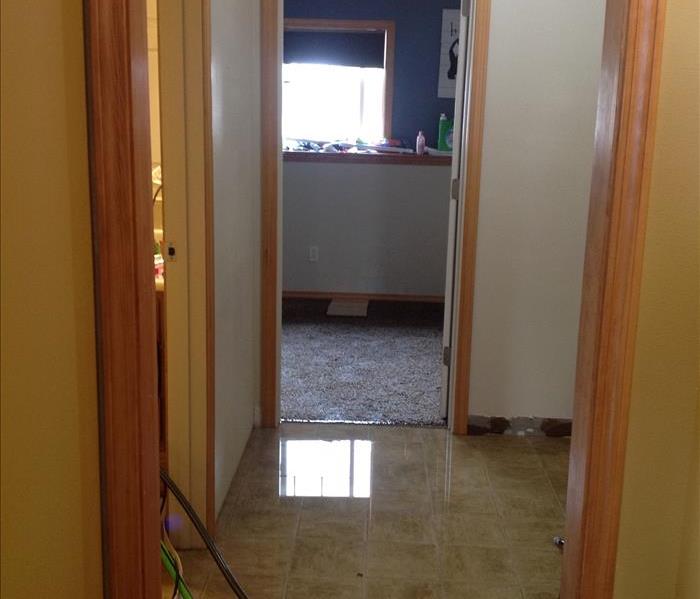 Water damage in Vinnings, GA
Water damage in Vinnings, GA
When water overruns the interior of your home, you are likely to have many questions. Your first impulse might be to try and fix things on your own, but any significant flood event requires professional help. You might wonder, "Who should I call?" For major plumbing problems, a plumbing contractor can come to your home and repair the problem. For help with the cleanup and restoration, a local water mitigation company in Vinings, GA, will have the resources and the personnel to minimize property damage. Technicians will arrive at your home in a matter of hours. They will use advanced equipment and hard-earned knowledge to restore your home to its proper condition.
The Question of Insurance Coverage
Water damage in your home inevitably becomes a financial issue. You will need to repair and replace items and there will be expenses for restoration services. To get the best information, it is vital that you call your insurance agent. In general, though, so long as the water mishap was unexpected and sudden, your homeowner's policy will cover some or all of the following expenses:
- Damage to the structure of your home
- Damage to personal items
- Costs to fix broken pipe
- Costs for restoration services
A flood that originates from the outside of your home is typically not covered. For this you need specific coverage for the overflowing of water into your house.
The Question of a Complete Restoration
How do you determine when your home has been completely restored after water damage? You should make sure all standing water has been removed from impacted areas. It is important to ensure the area has been dried out properly. This can be difficult to determine, so be sure to ask the company doing your cleanup. A reputable franchise will give you an honest answer. Also, pay attention to any lingering odors and insist those are addressed.
A flood in your home is a troubling event. You can overcome this temporary problem with quality help from professionals.
What to Look for in an Effective Security Fence
12/28/2020 (Permalink)
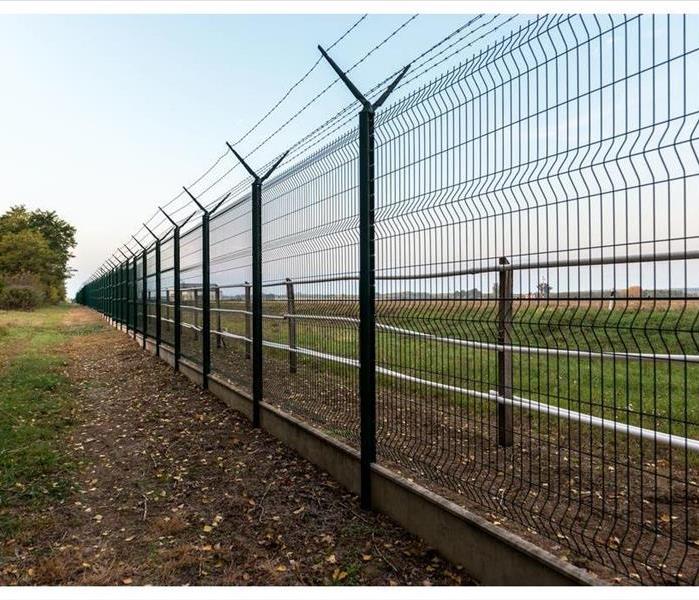 To protect your business, you are going to want an effective security fence
To protect your business, you are going to want an effective security fence
What to Look for in an Effective Security Fence
A lot of companies will install any fence around their property. They think this will keep vandals away from their damaged building until the remediation professionals arrive. However, that is not the case. Some fences can actually appeal to criminals. The best thing to do is to look for several traits that make a security fence effective.
See-Through
Always go with a see-through security fence. This allows people to see inside the lot, deterring criminals. A solid fence will provide cover that can attract vandals.
Hard to Climb
You want a fence that is hard to climb. Here are some things you should look for:
- At least 8 feet tall
- Few horizontal rails
- Spiked top
The height may be obvious as a frighteningly high climb will deter most criminals. However, you may have height restrictions, so you will want to make sure you meet codes before installing one. Avoid horizontal rails since these can work as a ladder for people who want to get onto your property.
As far as a spiked top, there are lots of options. Some fences will have points built into the vertical rails. Others will have a flat top, and you will need to install barbed wire or anti-climb spikes.
Impassable
If a vandal can go through or under your fence in Sandy Springs, GA, it does you no good. To prevent them from going under, you should secure the fence to the ground with concrete. Ideally, you will have the entire bottom secured. In some areas, this may not be possible. In those cases, make sure all the posts are in concrete.
You must also make sure they cannot go through your fence. Opt for heavy-duty metal so it cannot easily be cut through. Also, be sure your gate is just as secure. This is the weakest point in your fence. Therefore, you want to make sure it is made out of the same heavy-duty material as your fence. A padlock can add an extra layer of security.
To protect your business, you are going to want an effective security fence. Looking for these features can help you pick the right one.
3 Steps To Prevent Damage After A Pipe Bursts
12/15/2020 (Permalink)
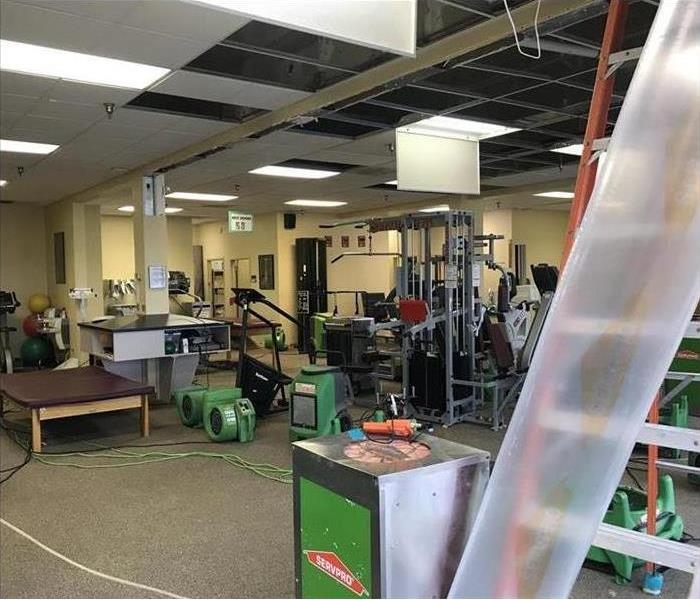 Water damage in Atlanta
Water damage in Atlanta
Steps To Take For Preventing Long-Term Problems
You may be fortunate enough as a business owner in Atlanta, GA, to not have to think about floods as a risk on a regular basis. However, flooding isn't only the result of natural disasters. Bursting pipes are one of the main causes of damage to businesses. Whether a pipe burst due to old age, freezing weather, or hard water buildup, a broken pipe can do real damage.
1. Call For Help
As soon as you can, call a water damage remediation specialist to come and evaluate the problem. Whether a large flood or a small one, water damage can cause long-term problems if it isn't dealt with correctly. Water can permeate all types of materials, allowing mold to grow behind solid drywall. Using a professional to fix broken pipe provides the additional benefit of them being able to assess any damage to the surrounding area.
2. Clean Up Safely
Once you've been told that there are no safety hazards, such as exposed electrical wiring, you can begin to handle some of the cleanup process yourself. Pumps and shop vacuums can be used to remove standing water. If you're able, move furniture and rugs, preferably outdoors, so that they can dry out completely. Running fans or dehumidifiers will help to dry out wet indoor areas and mitigate the spread of mold caused by bursting pipes.
3. Prevent Future Problems
Once you've chosen your remediation team, they will work with you to evaluate the full extent of damage. There exists a technology that enables professionals to check the moisture level behind walls so that you know the potential risk of mold growth without needing to tear down walls to check.
Proper drying and ventilation after water damage from bursting pipes will help to make your business a safe place for you and your employees to work.
Why Mold Grows in HVAC Air Ducts
12/8/2020 (Permalink)
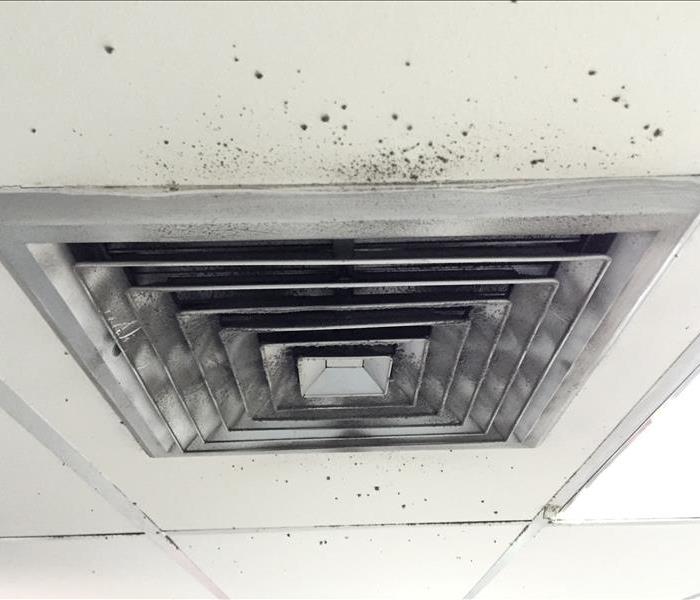 Mold growth in HVAC Air duct
Mold growth in HVAC Air duct
Mold can grow in most areas of commercial buildings in Atlanta, GA, especially if they provide the right conditions. Its effects are dangerous for building materials, causing severe damage if left untreated. HVAC systems circulate mold around the building and provide the humid conditions it needs to thrive. HVAC cleaning is especially important for commercial buildings to prevent the growth of unwanted mold.
The Conditions for Mold Growth in HVAC Systems
You can find mold growth in the humid and dark areas of your HVAC system, such as:
- The drip pan
- The AC evaporator coils
- The air ducts
Mold thrives in moist environmental conditions where it can find a host with the right nutrients. The dust in the ducts provides mold with nutrients and the dark, humid environment gives it the preferable conditions to grow. If the drip pan and AC evaporator coil are not cleaned regularly, they can also provide fungus the essential conditions for growth. It is important to conduct routine HVAC cleaning to prevent these parts from becoming worn or damaged.
Mold Prevention for HVAC Systems
To prevent mold growth on HVAC systems, make sure the air filters are routinely cleaned or replaced. HEPA filters are capable of filtering out the smallest air particles, making them ideal for filtering mold spores. Regular professional HVAC maintenance is also an essential part of mold prevention. It is recommended that this be done twice a year for commercial buildings. Routinely inspect your HVAC system for mold on air vents. Cleaning vents regularly will also prevent additional mold particles from circulating through your HVAC system.
Regular HVAC cleaning is necessary for mold prevention for commercial buildings and should be done by a professional mold cleaning service at least twice a year. If you have mold damage in your building, it is likely the mold is traveling through your HVAC system. Good filtration and regular maintenance can prevent mold growth and make your commercial building a cleaner, health-friendly environment.
How To Prevent a Grease Fire and What To Do When One Happens
12/8/2020 (Permalink)
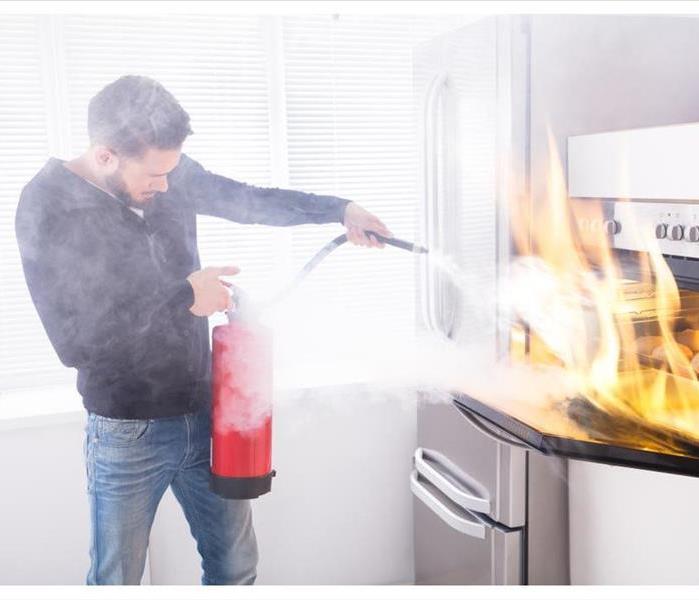 Kitchen fire in Atlanta, GA
Kitchen fire in Atlanta, GA
Home accidents most commonly occur in the kitchen. Among these incidents, a grease fire is particularly destructive. Here are a few ways to stop one from happening in yours, along with how to proceed should a fire break out.
Prevention Tips
Inhibit a greasy inferno from erupting in your cooking space by:
- Always attending an operating stove
- Removing anything flammable from the immediate area
- Only cooking while sober and fully awake
- Having pan lids and an extinguisher nearby
- Restricting children from entering the stove’s proximity
- Heating oil gradually
- Adding food slowly to minimize grease splatter
- Removing moisture from food before submerging it
Ignorance of safety measures could result in an unruly blaze. If an out-of-control grease fire causes damage to your house in Atlanta, GA, hire a company specializing in residential fire restoration to repair the charring and conduct a professional fire cleanup.
Extinguishing Procedures and Related Safety Tips
Place a metal lid or cookie sheet over wayward flames to smother the burning, leaving it untouched until it has cooled. If your fire is manageable, baking soda or salt can be used to snuff it out. Have a Class B dry chemical fire extinguisher within reach for instances where neither of these options is available or adequate.
Never attempt to extinguish an oil-based fire with water. Such attempts make splashes that can easily spread flames. Flour and baking powder are equally dangerous, as they feed fires instead of ending them.
As soon as your burn zone is contained, switch off the heating source. Let full pots and pans remain in place since scorching oils could easily spill. Shepherd everyone outside, remembering to close the door behind you. Bring your phone and dial 911 once everybody has reached safety.
Even minor grease fires have the potential to create severe structural damage. In addition to knowing how to react after such a crisis erupts, become familiar with how to prevent one.
Understanding the True Costs of Mold Remediation
11/24/2020 (Permalink)
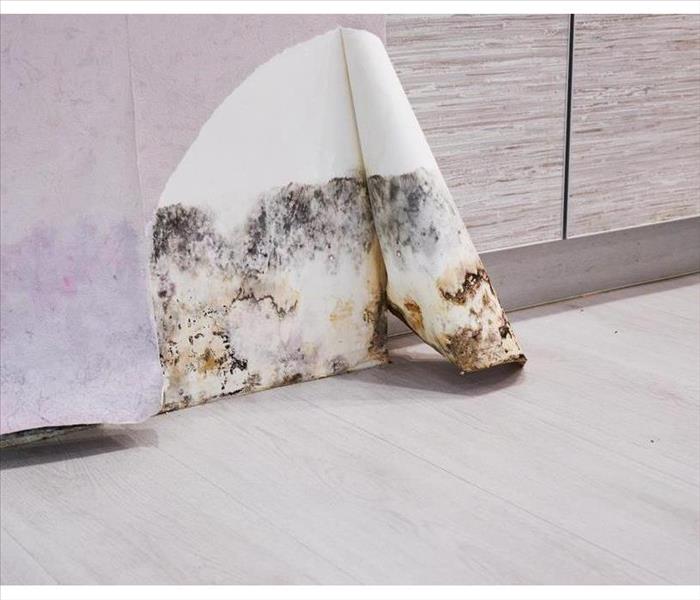 Mold damage in Atlanta, GA
Mold damage in Atlanta, GA
Understanding the True Costs of Mold Remediation
When you discover mold in your home, it’s not just a minor nuisance. It’s a serious problem that only gets worse if ignored. Mold removal requires the experience of professionals, an inspector and a team of trained mold remediation experts. A homeowner in Atlanta, GA, may pay anywhere from $500 to $6,000 to properly deal with mold damage; however, extensive remediation can be significantly more expensive, running into the tens of thousands of dollars. If you have a mold problem, the sooner you hire pros to address it, the better.
Hiring a Mold Inspector
A professional mold inspector or investigator can determine the extent of any damage and make recommendations about the level of mold removal necessary. Not only do professional investigators have the appropriate equipment to take samples, but they should have the right knowledge and meet other criteria:
- Be credentialed to offer inspection services and able to show documentation of industry-specific education
- Have no official affiliation to a mold remediation provider for an objective recommendation
- Produce an informative and detailed report based on samples taken
- Provide objective findings about the degree of mold damage
It’s important to check for these criteria, as the mold inspection industry is not heavily regulated. Usually, a mold inspector charges from $200 to $600 for a job that lasts from two to six hours.
Fully Addressing Mold
You should know that a mold inspector may have to cut your walls to properly assess where mold removal is necessary. Air samples can cost up to $150 per sample, which may or may not be included in the overall price. Be sure to ask this question up front.
The right provider won’t recommend black mold removal if it’s not needed. That person can direct you to a professional mold cleanup company that has the experience, tools, and know-how to restore your home to pre-damage conditions. Depending on the source of the mold growth, your property insurance may cover some or all of the costs for cleanup.
Bursting Pipes Are Terrible for Homes
11/23/2020 (Permalink)
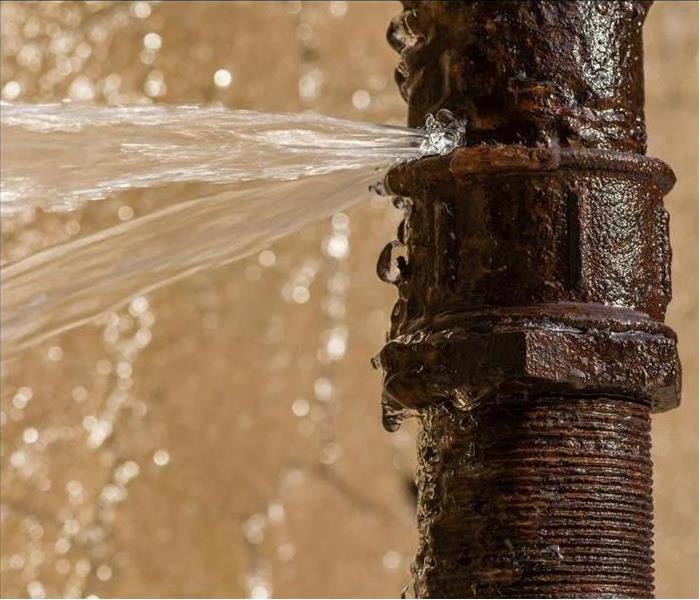 Bursting pipes are terrible homes
Bursting pipes are terrible homes
Bursting Pipes Are Terrible for Homes
Modern construction techniques do an amazing job of keeping the elements outside of your home and the inside cozy, warm and dry. A building envelope is designed to prevent water damage and last for a good number of years.
Unfortunately, bursting pipes bypass the envelope and usually leaves a disaster in their wake. If it happens to you, here’s what to do right away and the best way to deal with the resulting damage.
Your First Step
If you have a pipe break, there are a few immediate actions that can save big problems later:
- Turn off the electric.
- Shut off the water.
- Clean up clear flooded water.
Before you shut off your water, turn off your electricity! If the water reaches exposed wiring, it could cause severe wiring damage – or a fire! If you can safely turn it off, do so, but be careful. If you’re not comfortable shutting it off, skip this step.
Your Next Step
Then, shut off the water. Do so wherever it’s quickest; bursting pipes aren’t going to wait for you to make a decision. You can incrementally turn it on later to unaffected areas, if necessary.
Remove any flooded water as long as it hasn’t mixed with sewage. Dry the area quickly with a mop and towels, then set up a fan to facilitate airflow. You want to reduce humidity as much as practical.
Insurance Claims
If a plumbing problem is sudden and accidental, all common homeowner’s insurance policies should pay for the damages. However, if it’s been an ongoing problem – or the result of improper or lacking maintenance – your insurance claim may be denied. It’s your responsibility to take reasonable care of your property.
The Aftermath
Bursting pipes can cause a huge mess. If water has soaked into the walls or worked its way behind them, the damage can be extensive. You need an experienced water damage specialist who can:
- Fix broken pipe
- Locate hidden damage
- Help with insurance claim
They’ll then restore your home to its former condition. SERVPRO makes it “Like it never even happened.”
How Commercial Insurance Can Help After a Fire
11/11/2020 (Permalink)
 While commercial insurance can help your business recover financially, you may also need help with the cleanup and repairs
While commercial insurance can help your business recover financially, you may also need help with the cleanup and repairs
How Commercial Insurance Can Help After a Fire
If a fire damages your Peachtree Battle, GA, business, the loss can be devastating. Fortunately, commercial insurance can ease the financial burden.
Coverage
Coverage varies depending on your provider and particular policy. It is important to discuss your policy with your agent so that you know exactly what is covered. In general, though, insurance is likely to cover expenses stemming from the following causes:
- Fire
- Smoke
- Fire-extinguishing efforts: broken windows, water damage, etc.
- Fire-fighting fees
When purchasing or updating your policy, make sure that it covers everything you would want to replace if damaged by fire, including the building itself, machinery and inventory. Remember that there are likely exclusions to your coverage. For example, your policy may not cover liability. This means it would not pay for damage to your neighbor’s building caused by a fire originating on your property.
Claims
After incurring fire damage, you should call your commercial insurance provider for specific instructions on filing a claim. However, there are certain steps that will apply in most situations. Before you experience a loss of any kind, it is important to make an inventory. Make a list of purchase dates and prices of equipment, software, machinery and everything else covered by your policy. Take video or photographic evidence of all the items. Keep the photos and list in cloud storage or in a secure off-site location. After the fire has been extinguished, take photos or video of the damage before beginning repairs. Be sure to get as much detail as possible. If you are doing a video walkthrough of the damage, it may help to narrate and explain what the damaged items are. Accurate records of the covered property before and after damage ensures the insurance company has the information that they need to adequately reimburse you.
While commercial insurance can help your business recover financially, you may also need help with the cleanup and repairs. A certified restoration company can help you get your business back to preloss condition.
4 Tips To Stay Safe During Flood Cleanup
11/11/2020 (Permalink)
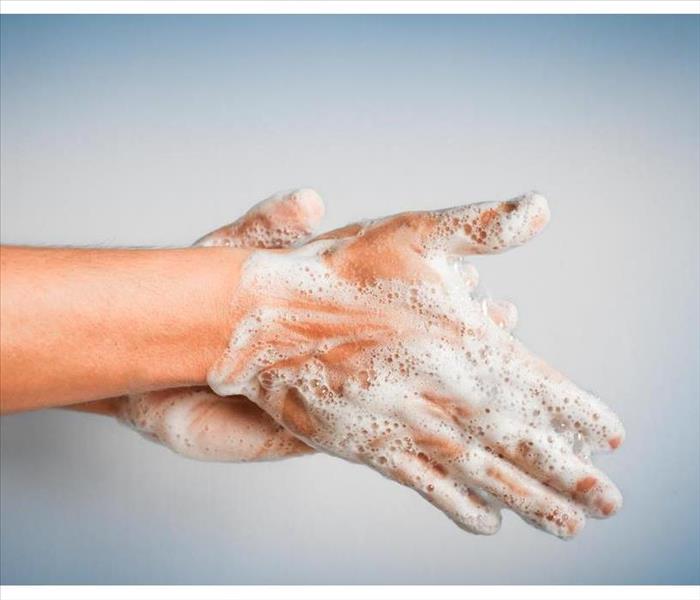 Always wash your hands with soap and water after handling anything that has touched floodwater
Always wash your hands with soap and water after handling anything that has touched floodwater
Follow These Tips To Stay Safe During Flood Cleanup
After a business flood, you’ll likely want to start cleaning up your flooded company as soon as possible, but you should fight the urge to jump in with both feet. Flood situations can pose serious health hazards.
1. Understand the Risk
Even clean-looking floodwater can be highly contaminated. Water from outside contains bacteria and other microorganisms and may be tainted with chemical pollutants. Floodwater from a broken pipe can contain human waste or other organic matter. Even clean water can become contaminated if it touches floors and other areas of your business, or mixes with contaminated water.
2. Call in the Pros
Before attempting any cleanup efforts yourself, call a professional flood damage restoration company in Morningside, GA. These experts have the proper training and equipment to deal with your flooded company quickly and safely. In addition to cleaning up the building, they can restore many contents of your business through freeze-drying, dry cleaning and other methods.
3. Wear Protective Gear
The Centers for Disease Control and Prevention suggest that anyone who is exposed to floodwaters should wear waterproof gloves, rubber boots and goggles to prevent contact with harmful bacteria. The CDC also suggests wearing a splash-proof face shield and liquid-repellent coveralls, if possible. Remove all protective gear and wash your hands thoroughly with soap and water before getting into your car or leaving the site of the flood.
4. Practice Safe Hygiene
Always wash your hands with soap and water after handling anything that has touched floodwater. Never eat, drink, smoke or chew gum during flood cleanup. Wash your hands thoroughly before eating, and before and after using the restroom.
The best practice is to leave flood cleanup to the professionals, who have experience working with potentially contaminated floodwaters. However, if you must enter your flooded company, be sure to take the necessary precautions to keep yourself safe.
5 Ways to Protect Your Business from Flood Damage
11/11/2020 (Permalink)
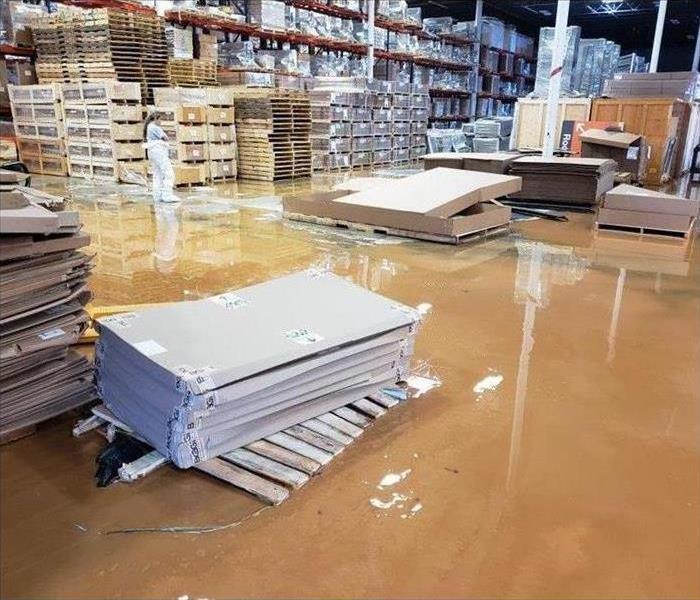 Commercial flood damage in Atlanta, GA
Commercial flood damage in Atlanta, GA
Prepare To Face A Flood
As a business owner, you need to make sure that you're prepared to take on any type of disaster, including flooding. Failure to address or remediate water damage in a timely manner can result in devastating amounts of secondary damage. Protect your business in Atlanta, GA, by preparing to face a flood before disaster strikes.
1. Assess Your Location's Risk.
There are multiple ways to assess your building's flood risk. The Federal Emergency Agency can provide you with a map that displays locations that have a higher flood risk.
2. Create and Discuss a Disaster Plan With Your Employees.
It's a good idea to implement a couple different disaster plans for your business. It is vital that you inform and train your employees on the specifics regarding any type of evacuation plan. This can help ensure everyone's safety in the event of a major black water flood.
3. Install Alternative Energy Sources.
Less severe storms or floods might not warrant a complete evacuation. If a business can continue safely, then you should make every attempt to do. Installing backup generators and air conditioning units can help expedite recovery time and reduce the amount of income lost.
4. Protect Important Records.
Your business's most important files should have multiple backups regardless. In case of flooding, you should make steps to waterproof these backup copies. Store physical documents in waterproof containers that are elevated at least one foot above the projected flood level. Electronic documents should have multiple backups stored in the Cloud.
5. Purchase Commercial Flood Insurance.
According to FEMA, almost 40% of small businesses are unable to recover from even the smallest of floods. Insurance coverage can help prevent flood damage from killing your business.
Don't let your business succumb to water damage caused by flooding. Take the time to ensure that your building, employees and personal property are all prepared to face any type of disaster. Make sure to contact storm remediation experts if your business has fallen victim to flood damage.
Cleanup Procedures Following a Flood
10/20/2020 (Permalink)
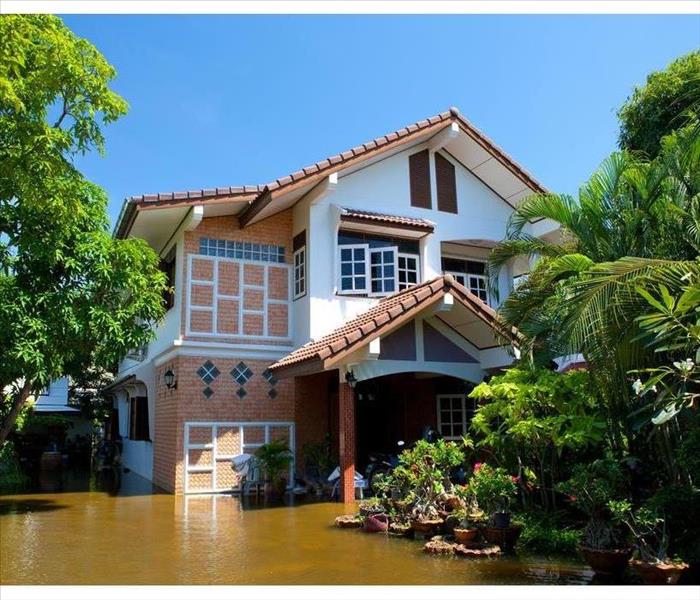 Flooded home in Paces Ferry, GA
Flooded home in Paces Ferry, GA
Steps To Take To Ensure Safety Following a Home Flood
For many residents in Paces Ferry, GA, the potential for flooding is always a risk. They've likely become flood experts since they've been through it a few times already. For people who are new to flood-prone areas, they may not yet the proper steps to take to ensure safety following a home flood. There are some basic things you should do no matter where you leave.
1. Assess the Damage
You should never enter your home immediately following a flood or while flood water is still standing. Call a restoration company to assess the damage for you. These service professionals can also start mitigation efforts to save anything that can be salvaged.
2. Crawlspace Damage
If sewage entered into your home's crawlspace, it is going to have to be removed before any other cleanup occurs. This may require waiting on the ground beneath the home to dry.
The process can be helped by employing the assistance of ventilation, and if possible, fans. This is part of the storm damage cleanup should not be attempted by yourself due to the bacteria and health risks associated with raw sewage.
3. Dry What You Can
Once you're cleared to re-enter the home, anything that needs to be saved needs to be dried as soon as possible. Perhaps the biggest risk following a home flood is the potential for mold growth. Mold is everywhere and it is always waiting to find a moist environment to grow. This growth can occur in as little as 24 hours.
It's possible you're going to have to let some things go during this phase of the cleanup. Home materials such as flooring and some dry wall will have to be replaced.
Experiencing a home flood is never easy, no matter how major or minor the damage. Things will be lost, but most things can be replaced. Always be familiar with your insurance policy so you know what to expect if you do experience flood damage.
Timely Bathroom Maintenance Can Prevent Leaks
10/13/2020 (Permalink)
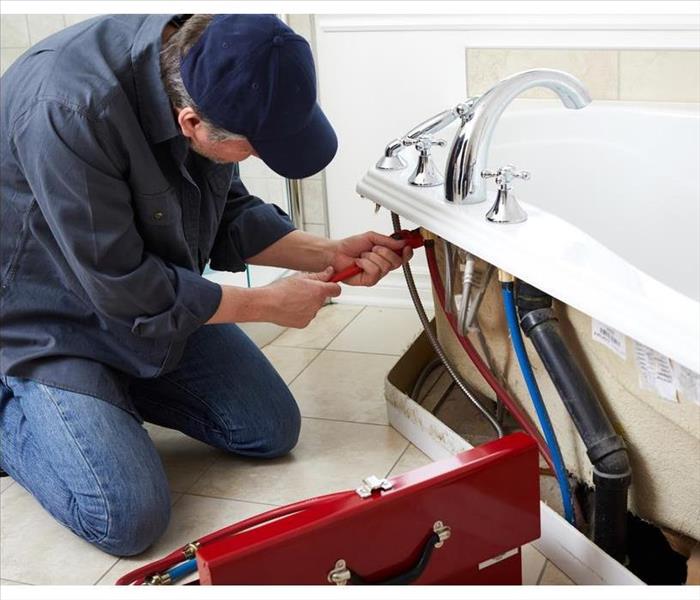 Bathroom maintenance can prevent leaks
Bathroom maintenance can prevent leaks
Timely Bathroom Maintenance Can Prevent Leaks
If you own a home or rent, it's a good idea to become familiar with your plumbing system. This could save you time and money as well as prevent a major problem. The mainline brings freshwater into your building, and from there, you have several supply lines that eventually bring water to individual faucets and appliances, often by way of smaller branch lines. Supply line damage, since it usually carries a large amount of water, can quickly flood your home in Buckhead, GA. Therefore, a smart homeowner pays attention to the condition of the supply lines.
The Need for Maintenance
If you have resided in your location for years, you might even know the history of your supply lines and when they last received maintenance. Knowing the following facts will help you keep tabs on the potential for a supply line leak:
- The age of the pipes
- The material of the pipes
- The date of the last major plumbing upgrade
- The length of any warranty from the plumbing contractor or the pipe manufacturer
Some materials last longer than others. Plastic piping becomes vulnerable to supply line damage after about five to eight years; of course, it could last much longer, but it usually will be not be warrantied for any longer. On the other hand, steel braided piping often has a lifetime warranty on materials.
The Need for Water Cleanup
Whether it is from supply line damage or a bathroom leak, water escaping into your home is a serious problem. A professional water remediation team can act quickly to limit the damage. Trained technicians will arrive Faster to Any Size Disaster and remove standing water before it has had time to cause structural damage to floors and walls. They will use powerful vacuums and air dryers to rid the home of excessive humidity, which is often a condition that invites mold growth. If you suspect your supply lines are worn, it might be time to have a plumbing contractor check things out.
4 important Facts All Homeowners Should Understand About Black Mold
9/30/2020 (Permalink)
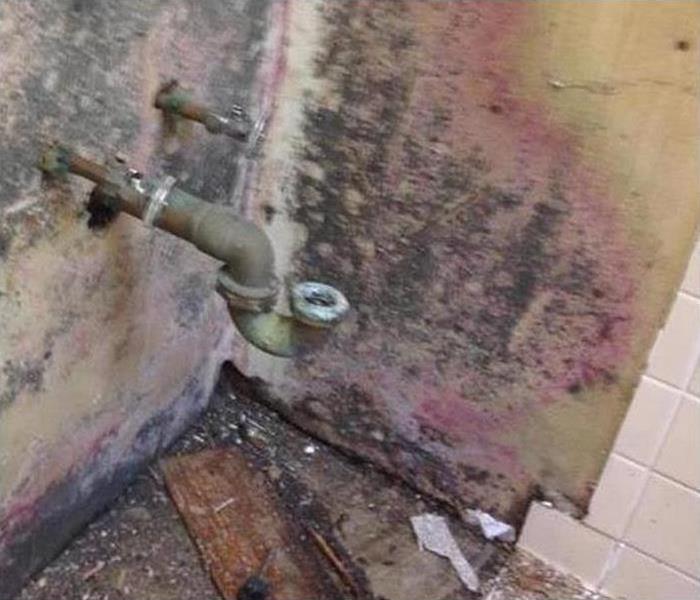 Mold growth in Virginia Highlands, GA
Mold growth in Virginia Highlands, GA
Here Are Four Things You Should Understand About The Organisms
Black mold is a hazard to your home. The microscopic spores reproduce quickly, attacking organic material. Left alone, they could spread among rooms, creating a major sanitation and rebuild project. When this situation happens, owners could face time-consuming reconstruction as well as massive costs. Residents, therefore, should understand that fungus is a serious concern, requiring swift and proper treatment.
1. Household Cleaners Won't Do the Job
You may want to grab a bottle from your closet to handle the mold cleanup. This isn't advised. Organisms can permeate into porous objects, digging in quite deep. Sprays and liquid chemicals may not reach the entire contamination, leaving the surface looking better but not eliminating the trouble. Eventually, it returns and could be even uglier. Instead, you'll want to consult a mold restoration company in Virginia Highlands, GA. The experts can assess the damage, determining the appropriate repair services.
2. The Spores Are Everywhere
People may get upset about black mold. These very common microbes, though, exist everywhere, far too small to see with the naked eye. Most likely they grabbed onto you while outside and then hitched a ride inside via your shoes, entryways or clothes. Because you are often the source, remember to leave footwear in a mudroom and close doors promptly. In addition, maintain proper air circulation. These actions reduce the house's exposure levels.
3. They're Nature's Decomposers
Fungus has a major role in the life cycle. It breaks down matter. In nature, the spores eat away at logs and branches. Inside, this is troubling as the organisms could feed off of paper, drywall, ceiling tiles and some flooring. When that happens, mold remediation should occur, tearing out absorbent items that show infestation.
4. They Love Moisture
Mold can't spread without water. It is the essential ingredient; thus, strive to keep flood exposure and humidity levels low. Run fans and the air handler. Wipe up spills immediately.
Black mold is unnerving. Maintain a dry environment, and work with professionals when conditions develop.
How Do You Put Out a Grease Fire?
9/18/2020 (Permalink)
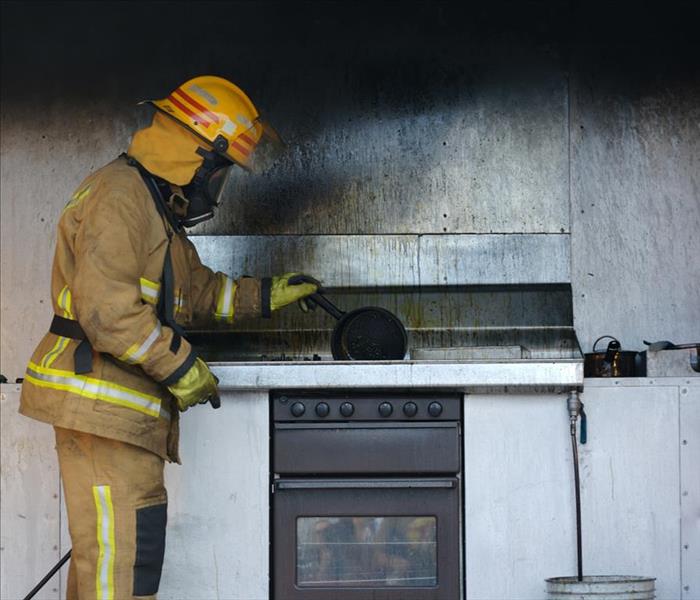 Kitchen fire in Ridgeview Park, GA
Kitchen fire in Ridgeview Park, GA
According to the National Fire Protection Association, cooking fires are the leading cause of home fires and home injuries. A grease fire happens when the oil or fat gets too hot, starts to boil, smokes, and catches fire. The smoking point of vegetable oils is around 450 degrees Fahrenheit; for animal fats, it’s about 375 degrees F.
Prevent cooking accidents by:
- Staying in the kitchen when using the stove
- Removing moisture from food before frying
- Never dropping frozen food in hot oil
- Heating the oil to the recommended temperature
- Having a lid handy in case the oil catches fire
- Keeping kids and pets away from the oven while cooking
Follow These Steps If You Have a Grease Fire
Step 1
If the blaze is contained in a pot or pan, cover the flames with a metal lid or baking sheet. If you still see fire, pour baking powder or salt on the area to smother it. Don’t use flour, baking powder, or biscuit mix as they’re flammable and will aggravate the problem.
Step 2
Turn off the burner if you can do so safely. Don’t try to move the pan; the motion can make the flames stronger. For a fire in a microwave or oven, don’t open the door. Turn the appliance off and call 911.
Step 3
Use a dry chemical fire extinguisher as a last resort. Use the PASS method: pull, aim, squeeze, and sweep. Don’t use water to put out the blaze. When it hits the hot pan, the water will turn to steam, which will spread the oil and the fire.
If you can’t put out the fire, evacuate your home and call 911. Stay at a safe distance and don’t go back in until directed by the firefighters.
A grease fire can do more than ruin your meal. If you find damage in your Ridgeview Park, GA, home, and need whelp with fire cleanup, get in touch with a local fire damage restoration company.
What Is Causing Ceiling Tile Discoloration?
9/9/2020 (Permalink)
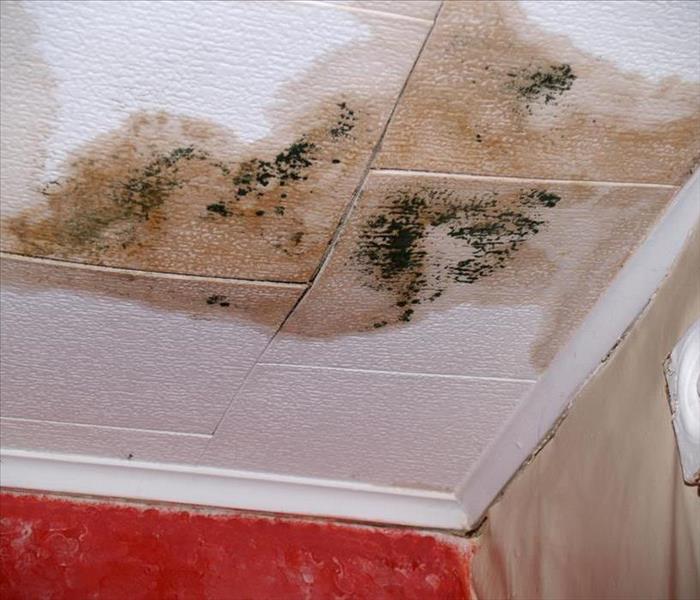 Water and mold damaged ceiling in Atlanta, GA
Water and mold damaged ceiling in Atlanta, GA
Three Causes Of Ceiling Tile Discoloration
Most commercial facilities have drop ceilings with ceiling tiles. It is not uncommon for these tiles to become damaged over time and require replacement. However, many facility managers may be disheartened to find a single tile or several tiles with stains and assume tile mold. While your mind may immediately jump to mold growth, any remediation service in Atlanta, GA, will likely explain that mold is possible, but there are at least three other causes, especially if the staining is recent.
- Plumbing problem
- Roof leak
- HVAC system issue
Plumbing Problem
If your facility is multi-story, then the tile discoloration is likely the result of plumbing issues and not tile mold. Ceiling tiles are incredibly porous and will soak in the water, causing a stain to appear on the other side. Fresh water stains typically look damp; they will likely turn the tile a shade of gray, especially if the tile is a lighter color naturally.
Roof Leak
If your facility is a single-story, then you may have a more significant issue than a minor plumbing leak. A roof leak can also result in the discoloration of ceiling tiles because of water damage. You may want to inspect your roof around the area of the staining to ensure that there is no existing external damage.
HVAC System Issue
If your facility has roof-mounted HVAC units, it is possible that the staining is a result of leaking from the condensation line or system and not mold. If you have an A/C unit above or near where the staining appeared, then you may want to contact an HVAC repair specialist.
While tile mold is a concern for any business because of the inevitable business interruption, it is not always the reason for tile staining. If you are genuinely concerned about the possibility of mold and cannot find any other likely causes for the staining, then contact a mold remediation company for a property assessment.
4 Things Your Property Insurance Should Cover
8/25/2020 (Permalink)
4 Things Your Property Insurance Should Cover
The commercial building you own in Morningside, GA, is a big investment. It is wise to make sure that it is protected in the event of a fire or some other catastrophe. When you purchase commercial insurance, your package should include a property policy. Here are five things that you should expect such a policy to cover.
1. The Property Itself
Property insurance is designed to pay for fire restoration services for the structures you own that have fire damage. There are several structures it includes:
- Building
- Signs
- Satellite dishes
- Fencing
It also includes damage to the part of the property that you own that surrounds your building. Your landscaping, sidewalks and driveway are also included in the coverage.
2. Manufacturing Equipment and Supplies
If you produce goods in your building, the machines used to do so can get damaged by fire just as easily as the building. You may also lose some of the inventory of completed products in storage or the materials used to make them. If any of these items are in the building and get damaged, the property policy of your commercial insurance package can reimburse you for the loss.
3. Office Equipment and Furniture
During a fire, your furniture, phones, computers and other office equipment can be damaged. Even if it's not burned by the flames, smoke and soot can damage sensitive equipment. The items you and your office employees use every day are protected by your property insurance.
4. Documents and Records
The recovery of important documents may be on your to-do list after a fire. Unless they are completely destroyed, it is likely that restoration experts can restore accounting records, payroll documents and other important items.
The specific policies found in a commercial insurance package may vary slightly from business to business, but any business owner who has property needs a property policy. It covers damage to your building and the important items inside it.
What To Do After a Flood
8/7/2020 (Permalink)
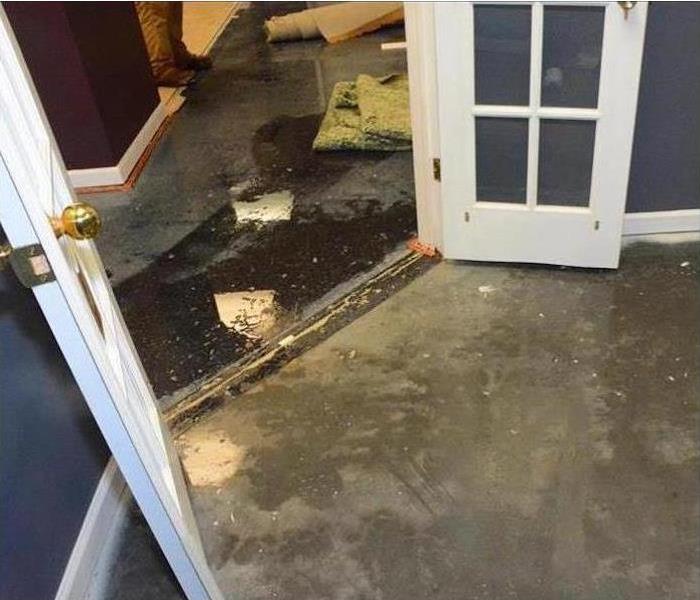 Storm damage in Morningside, GA
Storm damage in Morningside, GA
How To Minimize Flood Damage
When a major storm hits your home in Morningside, GA, you may have a lot of flood damage to handle. While you need certified flood restoration specialists to mitigate your home flood thoroughly, there are a few small steps you can take to minimize the damage it causes.
Sort
One of the main concerns with storm damage is the potential for mold growth. Mold damage can occur in as little as 24 hours after excess moisture has set in, so it's important to take steps to prevent it. Start by sorting the soggy items in your home into several categories:
- Textiles
- Wood
- Glass
- Ceramic
- Metal
- Plastic
Nonporous items such as metal, plastic, and glass will probably be okay. Even if mold grows on the surface, it is easier to mitigate. Textiles, carpet, and wood, however, may have to be thrown out if they have mold damage after a home flood. The spores grow into the fibers and may be impossible to remove.
Disinfect
Flood waterfalls under the Category 3 contamination level. This means it is likely infested with bacteria and microbes. A thorough cleaning that disinfects everything the water touches is necessary. The restoration company will handle most of this process, but you can clean some items. Clothing, for example, should be washed in hot water with a fabric-safe bleach. Surfaces should be considered contaminated until they have been properly cleaned.
Dry
To prevent secondary damage, you must get rid of extra moisture. The technicians may use several techniques to accomplish this. They pump the standing water out of your home and use industrial fans to dry surfaces. A dehumidifier may also be used to get the humidity level in your home back to the normal 40-50% it's supposed to be.
A home flood after a storm may cause a lot of damage. With quick action and the help of qualified professionals, you may be able to prevent further problems.
The Protective Gear Used in Mold Cleanup
7/29/2020 (Permalink)
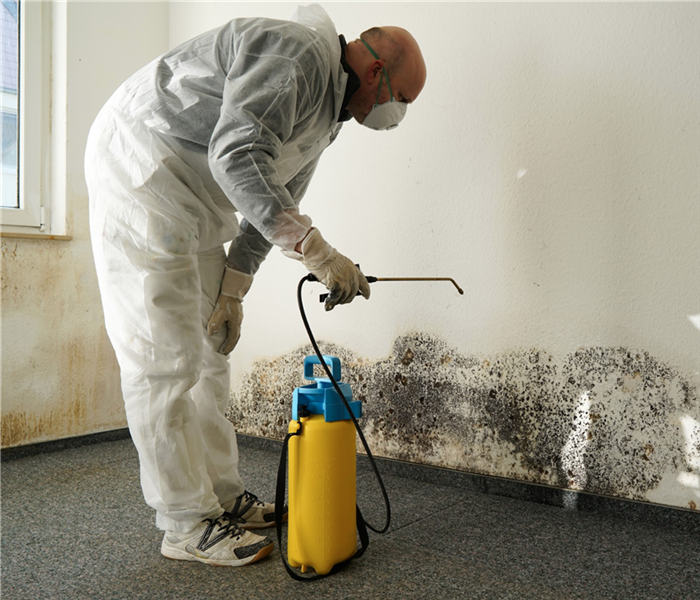 Mold remediation in Lenox Square, GA
Mold remediation in Lenox Square, GA
When technicians arrive at your Lenox Square, GA, home to tackle a mold issue, you may be surprised to see those professionals wearing face masks and other protective gear. You may wonder what's going on and whether you should be worried. The good news is that protective gear is often used to prevent mold spores from traveling through your home.
Personal Protective Equipment
The correct use of PPE makes it easier for professionals to complete their cleanup and repairs. Don't be surprised when you see technicians wearing a full protective suit:
- Coveralls with a hood
- Boots or booties covering shoes
- Disposable hair coverings
- Gloves
- Face masks
There may be slight variations in these items. For example, the disposable hair coverings may not be worn if the coveralls have a hood. Some technicians may wear disposable gloves and others may use gloves that are washed thoroughly.
Beyond Personal Gear
Protective equipment doesn't end with the gear that technicians wear. In addition to their protective clothing, mold damage cleanup and remediation professionals may also carry some heavy equipment with them. This equipment may include vacuums with HEPA filters, heavy plastic for containing mold spores, and a negative air machine that pulls spores from the air.
Containment Steps
There are many reasons to be careful when working around mold, and one of the most important is making sure that spores are contained. A single bit of mold traveling outside of the affected area can lead to new growth. Technicians are very careful not to allow this to happen.
A Professional Touch
When it comes to cleaning up mold safely, it's important to contact Lenox Square, GA, professionals. These technicians have completed training, worked with experienced mentors, and gained access to the tools and supplies necessary to respond to mold damage without spreading it to other areas of the home. When you see technicians wearing face masks, remember that they are just one piece of the safety equipment used in cleaning up mold.
Three Facts About Chemical Drain Cleaners
6/13/2020 (Permalink)
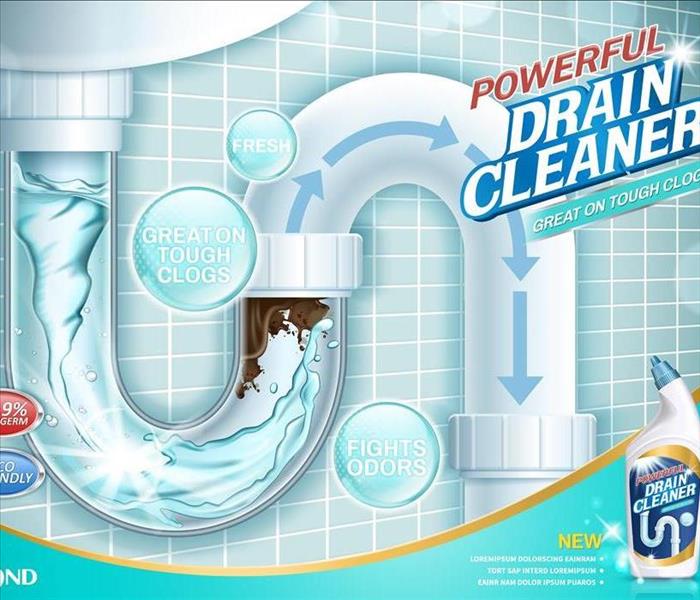 A chemical cleaner is supposed to work on a clogged drain
A chemical cleaner is supposed to work on a clogged drain
Three Facts About Chemical Drain Cleaners
Maintaining the building of your Paces Ferry, GA, business involves many different processes and procedures. Daily cleaning and regular maintenance are consuming tasks. If you’ve never experienced problems with a clogged drain, you may not know the best way to handle it. Here are three facts about drain cleaner so that you’re prepared for this type of situation.
1. Damaging
If you’re unfamiliar with clogs in pipes, your first reaction may be to just pour drain cleaner in the pipe. Unfortunately, what you may not know is that the cleaner can cause damage to pipes. This is because the chemicals produce heat which may damage vulnerable pipes. A powerful chemical pipe cleaner may cause more harm than good, especially with pipes and situations such as the following:
- Old metal pipes
- Plastic pipes
- When used incorrectly
2. Ineffective
A chemical cleaner is supposed to work on a clogged drain by creating an electron transfer to the substance causing the clog. This transfer produces heat which should disintegrate the clog. Unfortunately, when the substance is composed of fat, oil, or grease, many times the chemical is unable to break up the substance. The chemical and clog simply sit in the pipe or move down to another area of the pipe.
3. Harmful
Chemical cleaners are some of the most harmful substances available to consumers for sewage cleaning. Just opening the bottle and smelling the cleaner can cause stinging to your eyes and an irritated throat. Chemical cleaners can also burn human skin; therefore, it’s best to keep these types of cleaners away from inexperienced individuals.
If you experience a clogged drain at your business and want to take care of it on your own, try an auger or a biological cleaner. If you want to take care of the problem quickly you can also call a professional cleaning and restoration company to safely and effectively handle the problem.
We are Cleaning Experts
3/20/2020 (Permalink)
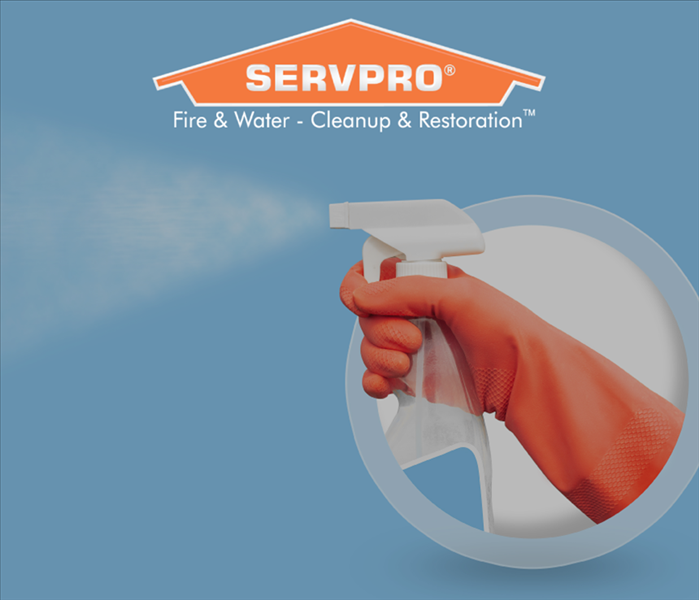 We will sanitize any commercial or residential property.
We will sanitize any commercial or residential property.
SERVPRO is Here to Help during this time of need
During this unprecedented time caused by the global pandemic of coronavirus, this is a reminder to our customers that we are specialists in cleaning services, and we adhere to the highest cleaning and sanitation standards.
Specialized Training
We are prepared to clean and disinfect your home or business, according to protocols set forth by the Centers for Disease Control and Prevention. We have years of experience in dealing with biological contaminants, and we will go beyond the scope of work that regular janitorial staff perform on a daily basis.
The CDC encourages cleaning of high-touch surfaces such as counters, tabletops, doorknobs, light switches, bathroom fixtures, toilets, phones, keyboards, tablets and tables. Other spaces mentioned in the CDC’s guidance for commercial spaces include:
- Kitchen/Food Areas
- Bathrooms
- Schools/Classrooms
- Offices
- Retail Spaces
- Water Fountains
- Shelving/Racks
- Sales Counters
- Carpets and Rugs
- Stair Handrails
- Elevator Cars
- Playground Equipment
- Fitness Equipment
Specialized Products
The CDC recommends usage of a labeled hospital-grade disinfectant with claims against similar pathogens to the coronavirus. Multiple products in the SERVPRO product line carry the EPA-approved emerging pathogens claims. While there is currently no product tested against this particular strain of the coronavirus, we are following all guidelines as provided by the CDC and local authorities.
Call Today for a Proactive Cleaning
If your home or business needs deep cleaning services, call the experts today – SERVPRO of North Atlanta/Buckhead, (404) 261-2925
 SERVPRO of North Atlanta / Buckhead keeps its trucks ready to respond immediately to your water damage emergency.
SERVPRO of North Atlanta / Buckhead keeps its trucks ready to respond immediately to your water damage emergency.




 24/7 Emergency Service
24/7 Emergency Service


























































